Anti-IL-5 therapies for asthma
- PMID: 35838542
- PMCID: PMC9285134
- DOI: 10.1002/14651858.CD010834.pub4
Anti-IL-5 therapies for asthma
Abstract
Background: This is the second update of previously published reviews in the Cochrane Library (2015, first update 2017). Interleukin-5 (IL-5) is the main cytokine involved in the proliferation, maturation, activation and survival of eosinophils, which cause airway inflammation and are a classic feature of asthma. Studies of monoclonal antibodies targeting IL-5 or its receptor (IL-5R) suggest they reduce asthma exacerbations, improve health-related quality of life (HRQoL) and lung function in appropriately selected patients, justifying their inclusion in the latest guidelines.
Objectives: To compare the effects of therapies targeting IL-5 signalling (anti-IL-5 or anti-IL-5Rα) with placebo on exacerbations, health-related quality-of-life (HRQoL) measures and lung function in adults and children with chronic asthma, and specifically in those with eosinophilic asthma refractory to existing treatments.
Search methods: We searched CENTRAL, MEDLINE, Embase, and two trials registers, manufacturers' websites, and reference lists of included studies. The most recent search was 7 February 2022.
Selection criteria: We included randomised controlled trials comparing mepolizumab, reslizumab and benralizumab versus placebo in adults and children with asthma.
Data collection and analysis: Two review authors independently extracted data and analysed outcomes using a random-effects model. We used standard methods expected by Cochrane.
Main results: Seventeen studies on about 7600 participants met the inclusion criteria. Six used mepolizumab, five used reslizumab, and six used benralizumab. One study using benralizumab was terminated early due to sponsor decision and contributed no data. The studies were predominantly on people with severe eosinophilic asthma, which was similarly but variably defined. One was in children aged 6 to 17 years; nine others included children over 12 years but did not report results by age group separately. We deemed the overall risk of bias to be low, with all studies contributing data of robust methodology. We considered the certainty of the evidence for all comparisons to be high overall using the GRADE scheme, except for intravenous (IV) mepolizumab and subcutaneous (SC) reslizumab because these are not currently licensed delivery routes. The anti-IL-5 treatments assessed reduced rates of 'clinically significant' asthma exacerbation (defined by treatment with systemic corticosteroids for three days or more) by approximately half in participants with severe eosinophilic asthma on standard care (at least medium-dose inhaled corticosteroids (ICS)) with poorly controlled disease (either two or more exacerbations in the preceding year or Asthma Control Questionnaire (ACQ) score of 1.5 or more), except for reslizumab SC. The rate ratios for these effects were 0.45 (95% confidence interval (CI) 0.36 to 0.55; high-certainty evidence) for mepolizumab SC, 0.53 (95% CI 0.44 to 0.64; moderate-certainty evidence) for mepolizumab IV, 0.43 (95% CI 0.33 to 0.55; high-certainty evidence) for reslizumab IV, and 0.59 (95% CI 0.52 to 0.66; high-certainty evidence) for benralizumab SC. Non-eosinophilic participants treated with benralizumab also showed a significant reduction in exacerbation rates, an effect not seen with reslizumab IV, albeit in only one study. No data were available for non-eosinophilic participants treated with mepolizumab. There were improvements in validated HRQoL scores with all anti-IL-5 agents in severe eosinophilic asthma. This met the minimum clinically important difference (MCID) for the broader St. George's Respiratory Questionnaire (SGRQ; 4-point change) for benralizumab only, but the improvement in the ACQ and Asthma Quality of Life Questionnaire (AQLQ), which focus on asthma symptoms, fell short of the MCID (0.5 point change for both ACQ and AQLQ) for all of the interventions. The evidence for an improvement in HRQoL scores in non-eosinophilic participants treated with benralizumab and reslizumab was weak, but the tests for subgroup difference were negative. All anti-IL-5 treatments produced small improvements in mean pre-bronchodilator forced expiratory flow in one second (FEV1) of between 0.08 L and 0.15 L in eosinophilic participants, which may not be sufficient to be detected by patients. There were no excess serious adverse events with any anti-IL-5 treatment; in fact, there was a reduction in such events with benralizumab, likely arising from fewer asthma-related hospital admissions. There was no difference compared to placebo in adverse events leading to discontinuation with mepolizumab or reslizumab, but significantly more discontinued benralizumab than placebo, although the absolute numbers were small (42/2026 (2.1%) benralizumab versus 11/1227 (0.9%) placebo). The implications for efficacy or adverse events are unclear.
Authors' conclusions: Overall this analysis supports the use of anti-IL-5 treatments as an adjunct to standard care in people with severe eosinophilic asthma and poor symptom control. These treatments roughly halve the rate of asthma exacerbations in this population. There is limited evidence for improved HRQoL scores and lung function, which may not meet clinically detectable levels. The studies did not report safety concerns for mepolizumab or reslizumab, or any excess serious adverse events with benralizumab, although there remains a question over adverse events significant enough to prompt discontinuation. Further research is needed on biomarkers for assessing treatment response, optimal duration and long-term effects of treatment, risk of relapse on withdrawal, non-eosinophilic patients, children (particularly under 12 years), comparing anti-IL-5 treatments to each other and, in patients meeting relevant eligibility criteria, to other biological (monoclonal antibody) therapies. For benralizumab, future studies should closely monitor rates of adverse events prompting discontinuation.
Antecedentes: Esta la segunda actualización de una revisión publicada anteriormente en la Biblioteca Cochrane (2015, primera actualización en 2017). La interleucina 5 (IL‐5) es la principal citoquina implicada en la proliferación, maduración, activación y supervivencia de los eosinófilos, que provocan la inflamación de las vías respiratorias y son una característica típica del asma. Los estudios sobre los anticuerpos monoclonales dirigidos a la IL‐5 o a su receptor (IL‐5R) indican que estos reducen las exacerbaciones del asma, mejoran la calidad de vida relacionada con la salud (CdVRS) y la función pulmonar en pacientes adecuadamente seleccionados, lo cual justifica su inclusión en las últimas guías.
Objetivos: Comparar los efectos de los tratamientos dirigidos a la señalización de la IL‐5 (anti‐IL‐5 o anti‐IL‐5Rα) con placebo, con respecto a las exacerbaciones, las medidas de calidad de vida relacionada con la salud (CdVRS) y la función pulmonar en adultos y niños con asma crónica, y específicamente en los que presentan asma eosinofílica resistente a los tratamientos existentes. MÉTODOS DE BÚSQUEDA: Se hicieron búsquedas en CENTRAL, MEDLINE, Embase, y en dos registros de ensayos clínicos, sitios web de fabricantes y listas de referencias de los estudios incluidos. La búsqueda más reciente se realizó el 7 de febrero de 2022. CRITERIOS DE SELECCIÓN: Se incluyeron ensayos controlados aleatorizados que compararon mepolizumab, reslizumab y benralizumab versus placebo en adultos y niños con asma. OBTENCIÓN Y ANÁLISIS DE LOS DATOS: Dos autores de la revisión de forma independiente extrajeron los datos y analizaron los desenlaces mediante un modelo de efectos aleatorios. Se utilizaron los métodos estándar previstos por Cochrane.
Resultados principales: Diecisiete estudios con unos 7600 participantes cumplieron los criterios de inclusión. Seis administraron mepolizumab, cinco proporcionaron reslizumab y seis benralizumab. Un estudio que utilizó benralizumab finalizó antes de tiempo por decisión de los patrocinadores y no proporcionó datos. Los estudios se realizaron principalmente en personas con asma eosinofílica grave, que se definió de forma parecida aunque variable. Uno de ellos se realizó en niños de seis a 17 años; otros nueve incluyeron a niños mayores de 12 años, pero no informaron de los resultados por grupos de edad por separado. Se consideró que el riesgo general de sesgo fue bajo, ya que todos los estudios que aportaron datos tuvieron una metodología sólida. La certeza de la evidencia para todas las comparaciones fue en general alta al utilizar el método GRADE, con la excepción del mepolizumab intravenoso (IV) y subcutáneo (SC) porque se trata de vías de administración no autorizadas en la actualidad. Los tratamientos con inhibidores de la IL‐5 evaluados redujeron las tasas de exacerbación del asma "clínicamente significativa" (definida por el tratamiento con corticosteroides sistémicos durante tres días o más) en aproximadamente la mitad de los participantes con asma eosinofílica grave que recibían atención estándar (al menos una dosis media de corticosteroides inhalados [CSI]) con un control deficiente de la enfermedad (dos o más exacerbaciones en el año anterior o una puntuación de 1,5 o más según el Asthma Control Questionnaire [ACQ]). Los cocientes de tasas para estos efectos fueron de 0,45 (intervalo de confianza [IC] del 95%: 0,36 a 0,55; evidencia de certeza alta) para mepolizumab SC, 0,53 (IC del 95%: 0,44 a 0,64; evidencia de certeza moderada) para mepolizumab IV, 0,43 (IC del 95%: 0,33 a 0,55; evidencia de certeza alta) para reslizumab IV y 0,59 (IC del 95%: 0,52 a 0,66; evidencia de certeza alta) para benralizumab SC. Los participantes que no presentaban asma eosinofílica tratados con benralizumab también mostraron una reducción significativa de las tasas de exacerbaciones, un efecto que no se observó con reslizumab IV, aunque solo en un estudio. No hubo datos sobre los participantes que no presentaban asma eosinofílica tratados con mepolizumab. Hubo mejorías moderadas en las puntuaciones validadas de la CdVRS con todos los inhibidores de la IL‐5 en el asma eosinofílica grave. Se alcanzó la diferencia mínima clínicamente importante (DMCI) del George's Respiratory Questionnaire (SGRQ; cambio de 4 puntos) para benralizumab, pero la mejoría en el ACQ y el Asthma Quality of Life Questionnaire (AQLQ), que se centran en los síntomas del asma, no alcanzó la DMCI (cambio de 0,5 puntos tanto en el ACQ como en el AQLQ) para todas las intervenciones. La evidencia fue débil en cuanto a la mejoría en las puntuaciones de la CdVRS en los participantes que no presentaban asma eosinofílica tratados con benralizumab y reslizumab, pero los análisis de las diferencias de subgrupos obtuvieron resultados negativos. Todos los tratamientos con inhibidores de la IL‐5 produjeron pequeñas mejorías en el flujo espiratorio forzado prebroncodilatador en un segundo (VEF1) de entre 0,08 y 0,15 l en los participantes con asma eosinofílica, las cuales podrían no ser suficientes para que los pacientes las detecten. No hubo un exceso de eventos adversos graves con ningún tratamiento inhibidor de la IL‐5; de hecho, hubo una reducción de tales eventos con benralizumab, probablemente derivada de un menor número de ingresos hospitalarios relacionados con el asma. No hubo diferencias en comparación con placebo en los eventos adversos que provocaran la suspensión del tratamiento con mepolizumab o reslizumab, pero hubo significativamente más interrupciones con el benralizumab que con placebo, aunque los números absolutos fueron pequeños (42/2026 [2,1%] benralizumab versus 11/1227 [0,9%] placebo). No están claras las implicaciones con respecto a la eficacia o los eventos adversos.
Conclusiones de los autores: En general este análisis apoya la administración de los tratamientos inhibidores de la IL‐5 como complemento a la atención estándar en las personas con asma eosinofílica grave y un control deficiente de los síntomas. Estos tratamientos reducen a cerca de la mitad la tasa de exacerbaciones del asma en esta población. Hay evidencia limitada de mejorías en las puntuaciones de la CdVRS y en la función pulmonar, aunque es posible que no alcancen niveles clínicamente detectables. Los estudios no informaron de problemas de seguridad con el mepolizumab ni el reslizumab, ni eventos adversos graves excesivos con benralizumab, aunque se mantiene la duda sobre qué eventos adversos son lo suficientemente significativos para la suspensión inmediata. Se necesitan estudios de investigación adicionales sobre los marcadores biológicos para evaluar la respuesta al tratamiento, la duración óptima y los efectos a largo plazo del tratamiento, el riesgo de recurrencia al retirarlo, los pacientes que no presentan asma eosinofílica, los niños (especialmente menores de 12 años), que comparen los tratamientos inhibidores de la IL‐5 entre sí y, en pacientes que cumplan criterios de elegibilidad relevantes, con otros tratamientos biológicos (anticuerpos monoclonales). En el caso del benralizumab, los estudios futuros deben vigilar atentamente las tasas de eventos adversos que provocan la interrupción inmediata.
Copyright © 2022 The Cochrane Collaboration. Published by John Wiley & Sons, Ltd.
Conflict of interest statement
HF: none known
AW: none known
CP: none known
FY: none known
SM: none known
EB: none known
Figures
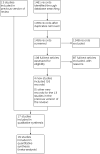
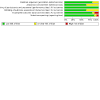
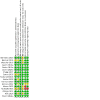
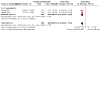
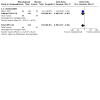
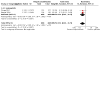
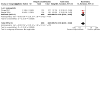
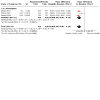
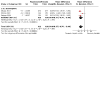
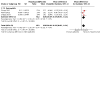

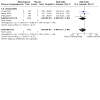
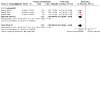
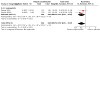
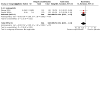
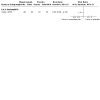
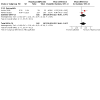

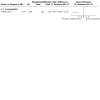

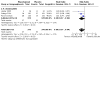
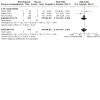
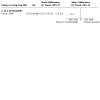
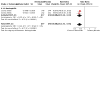
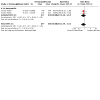
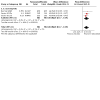

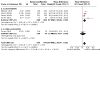
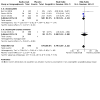
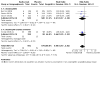

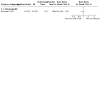
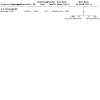
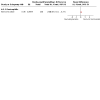
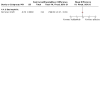
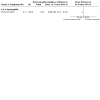
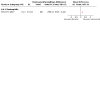
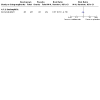
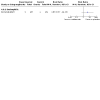


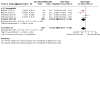
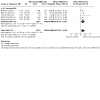
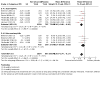
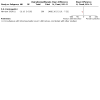
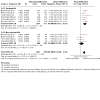
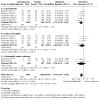
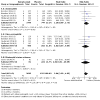
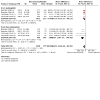
Update of
-
Anti-IL5 therapies for asthma.Cochrane Database Syst Rev. 2017 Sep 21;9(9):CD010834. doi: 10.1002/14651858.CD010834.pub3. Cochrane Database Syst Rev. 2017. Update in: Cochrane Database Syst Rev. 2022 Jul 12;7:CD010834. doi: 10.1002/14651858.CD010834.pub4. PMID: 28933516 Free PMC article. Updated.
Similar articles
-
Anti-IL5 therapies for asthma.Cochrane Database Syst Rev. 2017 Sep 21;9(9):CD010834. doi: 10.1002/14651858.CD010834.pub3. Cochrane Database Syst Rev. 2017. Update in: Cochrane Database Syst Rev. 2022 Jul 12;7:CD010834. doi: 10.1002/14651858.CD010834.pub4. PMID: 28933516 Free PMC article. Updated.
-
Systemic pharmacological treatments for chronic plaque psoriasis: a network meta-analysis.Cochrane Database Syst Rev. 2021 Apr 19;4(4):CD011535. doi: 10.1002/14651858.CD011535.pub4. Cochrane Database Syst Rev. 2021. Update in: Cochrane Database Syst Rev. 2022 May 23;5:CD011535. doi: 10.1002/14651858.CD011535.pub5. PMID: 33871055 Free PMC article. Updated.
-
Mepolizumab versus placebo for asthma.Cochrane Database Syst Rev. 2015 Jul 27;(7):CD010834. doi: 10.1002/14651858.CD010834.pub2. Cochrane Database Syst Rev. 2015. Update in: Cochrane Database Syst Rev. 2017 Sep 21;9:CD010834. doi: 10.1002/14651858.CD010834.pub3. PMID: 26214266 Updated.
-
Anti-interleukin-13 and anti-interleukin-4 agents versus placebo, anti-interleukin-5 or anti-immunoglobulin-E agents, for people with asthma.Cochrane Database Syst Rev. 2021 Oct 19;10(10):CD012929. doi: 10.1002/14651858.CD012929.pub2. Cochrane Database Syst Rev. 2021. PMID: 34664263 Free PMC article.
-
Macrolides versus placebo for chronic asthma.Cochrane Database Syst Rev. 2021 Nov 22;11(11):CD002997. doi: 10.1002/14651858.CD002997.pub5. Cochrane Database Syst Rev. 2021. PMID: 34807989 Free PMC article.
Cited by
-
Differentiation and regulation of CD4+ T cell subsets in Parkinson's disease.Cell Mol Life Sci. 2024 Aug 17;81(1):352. doi: 10.1007/s00018-024-05402-0. Cell Mol Life Sci. 2024. PMID: 39153043 Free PMC article. Review.
-
Severe Asthma Remissions Induced by Biologics Targeting IL5/IL5r: Results from a Multicenter Real-Life Study.Int J Mol Sci. 2023 Jan 27;24(3):2455. doi: 10.3390/ijms24032455. Int J Mol Sci. 2023. PMID: 36768778 Free PMC article.
-
Exploratory analysis of the economically justifiable price of reslizumab for asthma severe in Colombia.BMC Public Health. 2025 Jun 6;25(1):2116. doi: 10.1186/s12889-025-23205-1. BMC Public Health. 2025. PMID: 40481431 Free PMC article.
-
Current Challenges in Pediatric Asthma.Children (Basel). 2024 May 24;11(6):632. doi: 10.3390/children11060632. Children (Basel). 2024. PMID: 38929213 Free PMC article. Review.
-
Insight into IL-5 as a Potential Target for the Treatment of Allergic Diseases.Biomedicines. 2024 Jul 10;12(7):1531. doi: 10.3390/biomedicines12071531. Biomedicines. 2024. PMID: 39062104 Free PMC article. Review.
References
References to studies included in this review
Bernstein 2020 {published data only}
-
- Bernstein JA, Virchow JC, Murphy K, Maspero JF, Jacobs J, Adir Y, et al. Effect of fixed-dose subcutaneous reslizumab on asthma exacerbations in patients with severe uncontrolled asthma and corticosteroid sparing in patients with oral corticosteroid-dependent asthma: results from two phase 3, randomised, double-blind, placebo-controlled trials. Lancet Respiratory Medicine 2020;8:461–74. - PubMed
-
- NCT02452190. Study of reslizumab in patients with uncontrolled asthma and elevated blood eosinophils. clinicaltrials.gov/show/NCT02452190 (first received 13 May 2015).
-
- NCT02501629. An efficacy and safety study of reslizumab subcutaneous in patients with oral corticosteroid dependent asthma and elevated blood eosinophils. www.clinicaltrials.gov/ct2/show/NCT02501629 (first received 17 July 2015).
Bjermer 2016 {published data only}
-
- Bjermer L, Lemiere C, Maspero J, Ciesielska M, O'Brien C, Zangrilli J. A randomized phase 3 study of the efficacy and safety of reslizumab in subjects with asthma with elevated eosinophils. European Respiratory Journal 2014;44(Suppl 58):P299. [CENTRAL: 1053372] [EMBASE: 71849984]
-
- Bjermer L, Lemiere C, Maspero J, Weiss S, Zangrilli J, Germinaro M. Reslizumab for inadequately controlled asthma with elevated blood eosinophil levels: a randomized phase 3 study. Chest 2016;150(4):789-98. [CENTRAL: 1139859] [PMID: ] - PubMed
-
- Maspero J, Bjermer L, Lemiere C, Ciesielska M, O'Brien C, Zangrilli J. A randomized phase 3 study assessing patient reported outcomes and safety of reslizumab in patients with asthma with elevated eosinophils. Annals of Allergy, Asthma and Immunology 2014;113(5 Suppl 1):A21. [CENTRAL: 1020022] [EMBASE: 71679175]
-
- NCT01270464. A study to evaluate the efficacy and safety of reslizumab (0.3 or 3.0 mg/kg) as treatment for patients (12-75 years of age) with eosinophilic asthma. clinicaltrials.gov/ct2/show/NCT01270464 (first received 29 December 2010).
Bleecker 2016 {published data only}
-
- Bleecker E, FitzGerald JM, Chanez P, Papi A, Weinstein SF, Barker P, et al. Benralizumab provides significant improvements for patients with severe, uncontrolled asthma: SIROCCO Phase III results. European Respiratory Journal 2016;48:OA4832.
-
- Bleecker ER, FitzGerald JM, Chanez P, Papi A, Weinstein SF, Barker P, et al. Efficacy and safety of benralizumab for patients with severe asthma uncontrolled with high-dosage inhaled corticosteroids and long-acting beta 2-agonists (SIROCCO): a randomised, multicentre, placebo-controlled phase 3 trial. Lancet 2016;388(10056):2115–27. - PubMed
-
- NCT01928771. Efficacy and safety study of benralizumab added to high-dose inhaled corticosteroid plus LABA in patients with uncontrolled asthma. clinicaltrials.gov/show/NCT01928771 (first received 16 August 2013).
Castro 2014a {published data only}
-
- Castro M, Gossage DL, Ward CK, Wu Y, Khatri DB, Molfino NA, et al. Benralizumab reduces exacerbations and improves lung function in adults with uncontrolled eosinophilic asthma. American Journal of Respiratory and Critical Care Medicine 2014;189:B101. [CENTRAL: 1131488] [EMBASE: 72043211]
-
- Castro M, Wenzel S, Kolbeck R, Khatry D, Christine W, Wu Y, et al. A phase 2 study of benralizumab on exacerbations, lung function, and asthma control in adults with uncontrolled eosinophilic asthma. European Respiratory Journal 2014;44 Suppl 58:2909. [CENTRAL: 1053384]
-
- Castro M, Wenzel SE, Bleecker ER, Pizzichini E, Kuna P, Busse WW, et al. Benralizumab, an anti-interleukin 5 receptor alpha monoclonal antibody, versus placebo for uncontrolled eosinophilic asthma: a phase 2b randomised dose-ranging study. Lancet Respiratory Medicine 2014;2(11):879-9. [PMID: ] - PubMed
-
- Eck S, Castro M, Sinibaldi D, White W, Folliot K, Gossage D, et al. Benralizumab effect on blood basophil counts in adults with uncontrolled asthma. European Respiratory Journal 2014;44 Suppl 58:297. [CENTRAL: 1053403] [EMBASE: 71849982]
-
- NCT01238861. Study to evaluate the efficacy and safety of MEDI-563 in adults with uncontrolled asthma. clinicaltrials.gov/ct2/show/NCT01238861 (first received 9 November 2010).
Castro 2015a {published data only}
-
- Brusselle G, Germinaro M, Weiss S, Zangrilli J. Reslizumab in patients with inadequately controlled late-onset asthma and elevated blood eosinophils. Pulmonary Pharmacology and Therapeutics 2017;43:39-45. - PubMed
-
- Castro M, Zangrilli J, Wechsler ME, Bateman ED, Brusselle GG, Bardin P, et al. Reslizumab for inadequately controlled asthma with elevated blood eosinophil counts: results from two multicentre, parallel, double-blind, randomised, placebo-controlled, phase 3 trials. Lancet Respiratory Medicine 2015;3(5):355-66. - PubMed
-
- Castro M, Zangrilli J, Wechsler ME. Corrections. Reslizumab for inadequately controlled asthma with elevated blood eosinophil counts: results from two multicentre, parallel, double-blind, randomised, placebo-controlled, phase 3 trials. Lancet Respiratory Medicine 2015;3(4):e15. [DOI: 10.1016/S2213-2600(15)00042-9] [EMBASE: 2015833476] - DOI - PubMed
-
- NCT01287039. A study to evaluate the efficacy and safety of reslizumab (3.0 mg/kg) in the reduction of clinical asthma exacerbations in patients (12-75 years of age) with eosinophilic asthma. clinicaltrials.gov/ct2/show/NCT01287039 (first received 28 January 2011).
Castro 2015b {published data only}
-
- Castro M, Zangrilli J, Wechsler ME, Bateman ED, Brusselle GG, et al. Reslizumab for inadequately controlled asthma with elevated blood eosinophil counts: results from two multicentre, parallel, double-blind, randomised, placebo-controlled, phase 3 trials. Lancet Respiratory Medicine 2015;3(5):355-66. - PubMed
-
- Castro M, Zangrilli J, Wechsler ME. Corrections to Reslizumab for inadequately controlled asthma with elevated blood eosinophil counts: results from two multicentre, parallel, double-blind, randomised, placebo-controlled, phase 3 trials. Lancet Respiratory Medicine 2015;3(4):e15. [EMBASE: 2015833476] - PubMed
-
- NCT01285323. A study to evaluate the efficacy and safety of reslizumab in patients with eosinophilic asthma. clinicaltrials.gov/ct2/show/NCT01285323 (first received 25 January 2011).
Chupp 2017 {published data only}
-
- Chupp GL, Bradford ES, Albers FC, Bratton DJ, Wang-Jairaj J, Nelsen LM, et al. Efficacy of mepolizumab add-on therapy on health-related quality of life and markers of asthma control in severe eosinophilic asthma (MUSCA): a randomised, double-blind, placebo-controlled, parallel-group, multicentre, phase 3b trial. Lancet Respiratory Medicine 2017;5(5):390-400. - PubMed
-
- NCT02281318. A randomised, double-blind, placebo-controlled, parallel-group, multi-centre 24-week study to evaluate the efficacy and safety of mepolizumab adjunctive therapy in subjects with severe eosinophilic asthma on markers of asthma control. clinicaltrials.gov/show/NCT02281318 (first received 30 October 2014).
Corren 2016 {published data only}
-
- Corren J, Weinstein S, Janka L, O'Brien C, Zangrilli J. A randomized phase 3 study of reslizumab efficacy in relation to blood eosinophil levels in patients with moderate to severe asthma. European Respiratory Journal 2014;44 Suppl 58:4673. [CENTRAL: 1053393] [EMBASE: 71849958]
-
- Corren J, Weinstein S, Janka L, Zangrilli J, Garin M. Phase 3 study of reslizumab in patients with poorly controlled asthma: effects across a broad range of eosinophil counts. Chest 2016;150(4):799-810. [CENTRAL: 1139856] [PMID: ] - PubMed
-
- NCT01508936. A 16-week, randomized, double-blind, placebo-controlled study to evaluate the efficacy and safety of reslizumab (3.0 mg/kg) treatment in patients with moderate to severe asthma. clinicaltrials.gov/show/NCT01508936 (first received 3 January 2012).
FitzGerald 2016 {published data only}
-
- FitzGerald JM, Bleecker E, Nair P, Korn S, Ohta K, Lommatzsch M, et al. Benralizumab reduces exacerbations in severe, uncontrolled asthma: results of the phase III CALIMA trial [OA1969]. In: European Respiratory Society 26th Annual Congress; 2016 Sep 3-7; London. 2016.
-
- FitzGerald JM, Bleecker ER, Nair P, Korn S, Ohta K, Lommatzsch M, et al. Benralizumab, an anti-interleukin-5 receptor α monoclonal antibody, as add-on treatment for patients with severe, uncontrolled, eosinophilic asthma (CALIMA): a randomised, double-blind, placebo-controlled phase 3 trial. Lancet 2016;388(10056):2128-41. - PubMed
-
- NCT01914757. A multicentre, randomized, double-blind, parallel group, placebo controlled, phase 3 study to evaluate the efficacy and safety of benralizumab in asthmatic adults and adolescents inadequately controlled on inhaled corticosteroid plus long-acting beta 2agonist (CALIMA). clinicaltrials.gov/show/NCT01914757 (first received 31 July 2013).
Haldar 2009 {published data only}
-
- EUCTR2005-001932-61-GB. Mepolizumab and exacerbation frequency in refractory eosinophilic asthma. A randomised, double blind, placebo controlled, parallel group trial. clinicaltrialsregister.eu/ctr-search/search?query=EUCTR2005-001932-61-GB (first received 16 November 2005).
-
- Gupta S, Halder P, Hargadon B, Sousa A, Marshall RP, Wardlaw AJ, et al. Assessment of changes in airways dimensions with mepolizumab treatment in refractory eosinophilic asthma. In: American Thoracic Society International Conference; 2009 May 15-20 San Diego. 2009:A3641. 4900100000024535
-
- Haldar P, Brightling C, Hargadon B, Gupta S, Monteiro W, Sousa A, et al. Mepolizumab (anti-IL5) and exacerbation frequency in refractory eosinophilic asthma. American Journal of Critical Care and Respiratory Medicine 2009;179:A3638. 4900100000024597
-
- Haldar P, Brightling CE, Singapuri A, Hargadon B, Gupta S, Monteiro W, et al. Outcomes after cessation of mepolizumab therapy in severe eosinophilic asthma: a 12-month follow-up analysis. Journal of Allergy and Clinical Immunology 2014;133(3):921-3. [EMBASE: 2014156329] [PMID: ] - PubMed
Harrison 2020 {published data only}
-
- Canonica GW, Harrison TW, Chanez P, Menzella F, Louis R. Benralizumab efficacy for severe, eosinophilic asthma with a diagnosis of nasal polyposis: results from the phase IIIb ANDHI trial. European Journal of Allergy and Clinical Immunology 2020;75(109):114.
-
- Harrison TW, Chanez P, Menzella F, Canonica GW, Louis R, Cosio BG, et al. Onset of effect and impact on health-related quality of life, exacerbation rate, lung function, and nasal polyposis symptoms for patients with severe eosinophilic asthma treated with benralizumab (ANDHI): a randomised, controlled, phase 3b trial. Lancet Respiratory Medicine 2021;9(3):260-74. - PubMed
-
- Kreindler J, Chanez P, Bourdin A, Burden A, Gil EG. Comprehensive response to benralizumab by patients with nasal polyposis and severe, eosinophilic asthma. Annals of Allergy, Asthma and Immunology 2020;125(5):S29.
-
- NCT03170271. A study of the safety and effectiveness of benralizumab to treat patients with severe uncontrolled asthma (ANDHI) [A multicenter, randomized, double-blind, parallel group, placebo controlled, phase 3b study to evaluate the safety and efficacy of benralizumab 30 mg SC in patients with severe asthma uncontrolled on standard of care treatment]. www.clinicaltrials.gov/ct2/show/NCT03170271 (first received 31 May 2017).
Jackson 2022 {published data only}
-
- Altman M, Bacharier L, Villarreal M, Gill M, Liu A, Gruchalla R, et al. Distinct airway inflammatory pathways associated with asthma exacerbations are modulated by mepolizumab therapy in children. In: Journal of Allergy and Clinical Immunology. Vol. 149 Suppl 2. 2022:AB146.
-
- Jackson D, Bacharier L, Gergen P, Gagalis L, Villarreal M, Gill M, et al. Phenotype-directed therapy with mepolizumab for urban children with exacerbation-prone asthma. Journal of Allergy and Clinical Immunology 2022;149(2):AB146.
-
- NCT03292588. A trial of mepolizumab adjunctive therapy for the prevention of asthma exacerbations in urban children (MUPPITS-2). https://clinicaltrials.gov/ct2/show/NCT03292588 (first received 29 March 2022).
Moore 2022 {published data only}
-
- Bel EH, Moore WC, Kornmann O, Poirier C, Kaneko N, Smith SG, et al. Continued long-term mepolizumab in severe eosinophilic asthma protects from asthma worsening versus stopping mepolizumab: COMET trial. European Respiratory Journal 2020;56:5280.
-
- Liu M, Bel E, Kornmann O, Humbert M, Kaneko N, Martin N, et al. Clinician/patient perception: asthma severity decreases and response increases with continuing versus stopping long-term mepolizumab (COMET). Annals of Allergy, Asthma & Immunology 2020;125(5):S30.
-
- Liu M, Bel E, Kornmann O, Humbert M, Kaneko N, Martin N, et al. Clinician/patient perception: asthma severity decreases and response increases with continuing versus stopping long-term mepolizumab (COMET). Annals of Asthma, Allergy and Immunology 2020;201:A4211.
-
- Moore WC, Kornmann O, Humbert M, Poirier C, Bel EH, Kaneko N, et al. Outcomes following continuation or stopping long-term mepolizumab treatment in patients with severe eosinophilic asthma: the randomized COMET trial. ATS Journals 2020;201(1):Meeting Abstracts A421.
NCT01947946 {published data only}
-
- NCT01947946. Efficacy and safety study of benralizumab added to medium-dose inhaled corticosteroid plus LABA in patients with uncontrolled asthma. clinicaltrials.gov/show/NCT01947946 (first received 11 September 2013).
Ortega 2014 {published data only}
-
- Albers FC, Lugogo N, Gilson MJ, Price R, Yancey SW. Long-term safety and efficacy of mepolizumab in patients with severe eosinophilic asthma. Journal of Allergy and Clinical Immunology 2016;137(2 Suppl 1):AB14. [CENTRAL: 1135293] [EMBASE: 72196801]
-
- Albers FC, Price R, Ortega H, Yancey SW, Nelsen LM. Effect of mepolizumab in severe eosinophilic asthma patients in relation to their baseline ACQ-5 and SGRQ scores. European Journal of Allergy and Clinical Immunology 2016;71:257-8.
-
- Albers FC, Price RG, Smith SG, Yancey SW. Mepolizumab efficacy in patients with severe eosinophilic asthma receiving different controller therapies. Journal of Allergy and Clinical Immunology 2017;140(5):1464-6. - PubMed
-
- Basu A, Dalal A, Canonica GW, Forshag M, Yancey SW, Nagar S, et al. Economic analysis of the phase III MENSA study evaluating mepolizumab for severe asthma with eosinophilic phenotype. Expert Review of Pharmacoeconomics and Outcomes Research 2017;17(2):121-31. - PubMed
-
- Forshag M, Dalal AA, Ortega H, Yancey S, Gunsoy NB, Canonica G. Healthcare resource use associated with exacerbations in patients with severe eosinophilic asthma. American Journal of Respiratory and Critical Care Medicine 2015;191:A4174. [CENTRAL: 1107017] [EMBASE: 72052049]
Park 2016 {published data only}
-
- Adachi M, Kim M-K, Imai N, Nakanishi T, Ohta K, Tohda Y, et al. A phase 2a study of benralizumab for patients with eosinophilic asthma in South Korea and Japan. American Journal of Respiratory and Critical Care Medicine 2015;191(Meeting Abstracts):A2495. [CENTRAL: 1101040] [EMBASE: 72050330]
-
- NCT01412736. A phase IIa study of KHK4563 (4563-003) [A phase IIa, double-blind, placebo-controlled dose-ranging study to evaluate the efficacy and safety of KHK4563 in adults with uncontrolled, suspected eosinophilic asthma]. clinicaltrials.gov/show/NCT01412736 (first received 7 August 2011).
-
- Park HS, Kim MK, Imai N, Nakanishi T, Adachi M, Ohta K, et al. A phase 2a study of benralizumab for patients with eosinophilic asthma in South Korea and Japan. International Archives of Allergy and Immunology 2016;169(3):135-45. [CENTRAL: 1152856] [EMBASE: 20160326586] [PMID: ] - PubMed
Pavord 2012a {published data only}
-
- NCT01000506. Dose ranging efficacy and safety with mepolizumab in severe asthma (DREAM) [A multicenter, randomized, double-blind, placebo-controlled, parallel group, dose ranging study to determine the effect of mepolizumab on exacerbation rates in subjects with severe uncontrolled refractory asthma]. clinicaltrials.gov/ct2/show/NCT01000506 (accessed 16 January 2015). 4900126000001337
-
- Ortega H, Chupp G, Bardin P, Bourdin A, Garcia G, Hartley B, et al. The role of mepolizumab in atopic and nonatopic severe asthma with persistent eosinophilia. European Respiratory Journal 2014;44(1):239-41. - PubMed
-
- Ortega H, Li H, Suruki R, Albers F, Gordon D, Yancey S. Cluster analysis and characterization of response to mepolizumab: a step closer to personalized medicine for patients with severe asthma. Annals of the American Thoracic Society 2014;11(7):1011-7. [PMID: ] - PubMed
-
- Ortega HG, Chupp G, Bardin P, Bourdin A, Hartley B, Humbert M. The role of mepolizumab in atopic and non-atopic patients with refractory eosinophilic asthma. American Journal of Respiratory and Critical Care Medicine 2013;187:A3861. [CENTRAL: 1129378] [EMBASE: 71983360]
-
- Pavord I, Korn S, Howarth P, Bleecker E, Buhl R, Keene O, et al. Mepolizumab (anti-IL-5) reduces exacerbations in patients with refractory eosinophilic asthma. European Respiratory Journal 2012;40 Suppl 56:36s [349]. 4900100000068022
References to studies excluded from this review
Albers 2016 {published data only}
-
- Albers F, Cockle S, Gunsoy N, Shin JY, Nelsen L, Muellerova H. Eligibility for mepolizumab, omalizumab and reslizumab in the EU population: The IDEAL study [PA4216]. In: European Respiratory Society 26thAnnual Congress; 2016 Sep 3-7; London. 2016.
Albers 2020 {published data only}
Alvarez‐Cuesta 1994 {published data only}
-
- Alvarez-Cuesta E, Cuesta-Herranz J, Puyana-Ruiz J, Cuesta-Herranz C, Blanco-Quiros A. Monoclonal antibody-standardized cat extract immunotherapy: risk-benefit effects from a double-blind placebo study. Journal of Allergy and Clinical Immunology 1994;93(3):556-66. 4900100000004347 - PubMed
Armentia 1992 {published data only}
-
- Armentia A, Arranz M, Martin JM, la Fuente R, Sanchez P, Barber D, et al. Evaluation of immune complexes after immunotherapy with wheat flour in bakers' asthma. Annals of Allergy 1992;69(5):441-4. 4900100000003916 - PubMed
Austin 2016 {published data only}
-
- Austin D, Pouliquen I, Keene O, Yancey S. Blood eosinophil dose response to oral corticosteroids in a population of patients with severe asthma [PA1110]. In: European Respiratory Society 26th Annual Congress; 2016 Sep 3-7; London. 2016.
Austin 2016a {published data only}
-
- Austin D, Pouliquen I, Keene O, Yancey S. Blood eosinophil dose response to oral corticosteroids in a population of patients with severe asthma. European Respiratory Journal 2016;48:PA1110.
Ayres 2004 {published data only}
-
- Ayres JG, Higgins B, Chilvers ER, Ayre G, Blogg M, Fox H. Efficacy and tolerability of anti-immunoglobulin E therapy with omalizumab in patients with poorly controlled (moderate-to-severe) allergic asthma. Allergy 2004;59(7):701-8. 4900100000017042 - PubMed
Bardford 2018 {published data only}
-
- Bardford E, Nelsen L, Bratton D, Albers F, Taille C, Magnan A. Efficacy of mepolizumab in patients with severe eosinophilic asthma who had previously received omalizumab treatment. Pneumologie 2018;72:S17.
Bel 2014 {published data only}
-
- Bel EH, Wenzel SE, Thompson PJ, Prazma CM, Keene O, Yancey SW, et al. Oral corticosteroid-sparing effect of mepolizumab in severe eosinophilic asthma: The SIRIUS study. European Respiratory Journal 2014;44 Suppl 58:2907. [CENTRAL: 1053369]
-
- Bel EH, Wenzel SE, Thompson PJ, Prazma CM, Keene ON, Yancey SW, et al. Oral glucocorticoid-sparing effect of mepolizumab in eosinophilic asthma. New England Journal of Medicine 2014;371(13):1189-97. [CENTRAL: 1013105] [EMBASE: 25199060] [PMID: ] - PubMed
-
- NCT01691508. Mepolizumab steroid-sparing study in subjects with severe refractory asthma [MEA115575: a randomised, double-blind, placebo-controlled, parallel-group, multicenter study of mepolizumab adjunctive therapy to reduce steroid use in subjects with severe refractory asthma]. clinicaltrials.gov/ct2/show/NCT01691508 (first received 20 September 2012). 4900126000001341
-
- Sehmi R, Smith SG, Kjarsgaard M, Radford K, Boulet LP, Lemiere C, et al. Role of local eosinophilopoietic processes in the development of airway eosinophilia in prednisone-dependent severe asthma. Clinical and Experimental Allergy 2015;46(6):793-802. [CENTRAL: 1129187] [PMID: ] - PubMed
Berger 2003 {published data only}
-
- Berger W, Gupta N, McAlary M, Fowler-Taylor A, McAlary M, Fowler-Taylor A. Evaluation of long-term safety of the anti-IgE antibody, omalizumab, in children with allergic asthma. Annals of Allergy, Asthma and Immunology 2003;91(2):182-8. 4900102000000524 [4900102000000524] - PubMed
Bernstein 2020a {published data only}
-
- Bernstein JA, Singh U, Rao MB, Berendts K, Zhang X, Mutasim D. Benralizumab for chronic spontaneous urticaria. New England Journal of Medicine 2020;383(14):1389-91. - PubMed
Bjermer 2017 {published data only}
-
- Bjermer L, Garin M, Sun SX. Clinically meaningful improvements with reslizumab in patient-reported outcomes and lung function in a sub-population defined by the EU indication with >=3 exacerbations. European Respiratory Journal 2017;50:PA4687.
Blanken 2012 {published data only}
-
- Blanken M, Rovers M, Sanders E, Bont L. Ethical considerations and rationale of the MAKI trial: a multicenter double-blind randomized placebo-controlled trial into the preventive effect of palivizumab on recurrent wheezing associated with respiratory syncytial virus infection in children with a gestational age of 33-35 weeks. Contemporary Clinical Trials 2012;33(6):1287-92. 4900100000067009 - PubMed
Blanken 2013 {published data only}
-
- Blanken MO, Rovers MM, Molenaar JM, Winkler-Seinstra PL, Meijer A, Kimpen JL, et al. Respiratory syncytial virus and recurrent wheeze in healthy preterm infants. New England Journal of Medicine 2013;368(19):1791-9. 4900100000077900 [4900100000077900] - PubMed
Bleecker 2018a {published data only}
-
- Bleecker E, McDonald M, Garin MC. Decreases in blood eosinophil levels correlate with lung function improvement with reslizumab treatment. American Journal of Respiratory and Critical Care Medicine 2018;197:A1362.
Bleecker 2018b {published data only}
Boulet 1997 {published data only}
-
- Boulet LP, Chapman KR, Cote J, Kalra S, Bhagat R, Swystun VA, et al. Inhibitory effects of an anti-IgE antibody E25 on allergen-induced early asthmatic response. American Journal of Respiratory and Critical Care Medicine 1997;155(6):1835-40. 4900100000005712 - PubMed
Bourdin 2018 {published data only}
-
- Bourdin A, McDonald M, Vanlandingham R. Reslizumab is effective in asthma patients with or without allergen specific IgE. European Journal of Allergy and Clinical Immunology 2018;73(105):202-3.
Bourdin 2020 {published data only}
Bousquet 2004 {published data only}
-
- Bousquet J, Wenzel S, Holgate S, Lumry W, Freeman P, Fox H. Predicting response to omalizumab, an anti-IgE antibody, in patients with allergic asthma. Chest 2004;125(4):1378-86. 4900100000016325 - PubMed
Bousquet 2011 {published data only}
-
- Bousquet J, Siergiejko Z, Swiebocka E, Humbert M, Rabe KF, Smith N, et al. Persistency of response to omalizumab therapy in severe allergic (IgE-mediated) asthma. Allergy 2011;66(5):671-8. 4900100000026344 - PubMed
Brightling 2014 {published data only}
-
- Brightling CE, She D, Ranade K, Piper E. Efficacy and safety of tralokinumab, an anti-il-13 monoclonal antibody, in a phase 2b study of uncontrolled severe asthma. American Journal of Respiratory and Critical Care Medicine 2014;189:A6670. [CENTRAL: 1035526] [EMBASE: 72047302]
Brown 2007 {published data only}
-
- Brown R, Turk F, Dale P, Bousquet J. Cost-effectiveness of omalizumab in patients with severe persistent allergic asthma. Allergy 2007;62(2):149-53. 4900100000019948 [4900100000019948] - PubMed
Brusselle 2016 {published data only}
-
- Brusselle G, McElhattan J, Canvin J, Buhl R. Reslizumab (RES) in asthma patients (pts) with severe eosinophilic asthma stratified by GINA asthma steps 4 and 5: analysis of two phase 3, placebo (PBO)-controlled trials [PA4107]. In: European Respiratory Society 26thAnnual Congress; 2016 Sep 3-7; London. 2016.
Brusselle 2017 {published data only}
Bryant 1975a {published data only}
-
- Bryant DH, Burns MW, Lazarus L. The correlation between skin tests, bronchial provocation tests and the serum level of IgE specific for common allergens in patients with asthma. Clinical Allergy 1975;5(2):145-57. 4900100000023985 - PubMed
Bryant 1975b {published data only}
-
- Bryant DH, Burns MW, Lazarus L. Identification of IgG antibody as a carrier of reaginic activity in asthmatic patients. Journal of Allergy and Clinical Immunology 1975;56(6):417-28. 4900100000024002 - PubMed
Buhl 2000a {published data only}
-
- Buhl R, Kunkel G, Soler M, Bensch G, Wolfe J, Noga O, et al. RhuMAb-25 improves asthma-specific quality of life in patients with allergic asthma. European Respiratory Journal 2000;16 Suppl 31:465s. 4900100000013847
Buhl 2000b {published data only}
-
- Buhl R, Soler M, Fox H, Ashby M, McAlary M, Cooper J, et al. Recombinant humanized monoclonal antibody (rhuMAb) E25 in the prevention of serious asthma exacerbations. European Respiratory Journal 2000;16 Suppl 31:277s. 4900100000013848
Buhl 2002 {published data only}
-
- Buhl R, Soler M, Matz J, Townley R, O'Brien J, Noga O, et al. Omalizumab provides long-term control in patients with moderate-to- severe allergic asthma. European Respiratory Journal 2002;20(1):73-8. 4900100000012867 - PubMed
Bush 1985 {published data only}
-
- Bush RK, Taylor SL, Nordlee JA, Busse WW. Soybean oil is not allergenic to soybean-sensitive individuals. Journal of Allergy and Clinical Immunology 1985;76(2 Pt 1):242-5. 4900100000001757 - PubMed
Busse 2001 {published data only}
-
- Busse WW, Corren J, Lanier BQ, McAlary M, Fowler-Taylor A, Della Cioppa G, et al. Omalizumab, anti-IgE recombinant humanized monoclonal antibody, for the treatment of severe allergic asthma. Journal of Allergy and Clinical Immunology 2001;108(2):184-90. 4900100000010636 [4900100000010636] - PubMed
Busse 2008 {published data only}
-
- Busse WW, Israel E, Nelson HS, Baker JW, Charous BL, Young DY, et al. Daclizumab improves asthma control in patients with moderate to severe persistent asthma: a randomized, controlled trial. American Journal of Respiratory and Critical Care Medicine 2008;178(10):1002-8. 4900100000022833 - PubMed
Busse 2015 {published data only}
-
- Busse WW, Wang M, Gibson J, Gottlow M, Braddock M, Colice G. TROPOS: designing a clinical trial to evaluate the oral corticosteroid-sparing effect of a biologic in severe asthma. Clinical Investigation 2015;5(8):723-30. [CENTRAL: 1096145] [EMBASE: 2015401568]
Buttner 2003 {published data only}
-
- Buttner C, Lun A, Splettstoesser T, Kunkel G, Renz H. Monoclonal anti-interleukin-5 treatment suppresses eosinophil but not T-cell functions. European Respiratory Journal 2003;21(5):799-803. 4900100000015258 - PubMed
-
- Buttner C, Splettstosser T, Lun A, Renz H, Kunkel G. The influence of anti-IL-5 anti-bodies on leucocyte differentiation and function in patients with asthmatic. Pneumologie 2001;55(SH1):S69.
Caffarelli 2000 {published data only}
-
- Caffarelli C, Sensi LG, Marcucci F, Cavagni G. Preseasonal local allergoid immunotherapy to grass pollen in children: a double-blind, placebo-controlled, randomized trial. Allergy 2000;55(12):1142-7. 4900100000009985 - PubMed
Canvin 2016 {published data only}
-
- Canvin J, Noble R, Djukanovic R, Curran M, Weiss S. Early identification of responders to reslizumab at 16 weeks using an algorithm derived from the pivotal clinical studies of severe eosinophilic asthma (SEA) patients [OA2998]. In: European Respiratory Society 26th Annual Congress; 2016 Sep 3-7; London. 2016.
Carr 2017 {published data only}
-
- Carr W, McDonald M, Meizlik P. Reslizumab improves spirometric lung age in patients with severe eosinophilic asthma. Annals of Allergy, Asthma and Immunology 2017;119(5):S57. - PubMed
Carr 2019 {published data only}
-
- Carr WW, McDonald M, Meizlik P. Effect of intravenously administered reslizumab on spirometric lung age in patients with moderate-to-severe eosinophilic asthma. Allergy and Asthma Proceedings 2019;40(4):240-9. - PubMed
Castro 2011 {published data only}
-
- Castro M, Mathur S, Hargreave F, Boulet LP, Xie F, Young J, et al. Reslizumab for poorly controlled, eosinophilic asthma: a randomized, placebo-controlled study. American Journal of Respiratory and Critical Care Medicine 2011;184(10):1125-32. 4900100000056192 - PubMed
-
- Castro M, Mathur S, Hargreave F, Xie F, Young J, Wilkins HJ, et al. Reslizumab in the treatment of poorly controlled asthma in patients with eosinophilic airway inflammation. Annals of Allergy, Asthma and Immunology 2010;105(5 Suppl):A43. 4900100000054093
-
- Mathur S, Castro M, Hargreave F, Xie F, Wilkins HJ, Henkel T, et al. Efficacy of reslizumab in patients with poorly controlled eosinophilic asthma: subgroup analysis of patients with nasal polyps. Journal of Allergy and Clinical Immunology 2011;127(2 Suppl 1):AB84. 4900100000026800
-
- NCT00587288. Efficacy and safety study of reslizumab to treat poorly controlled asthma [An efficacy and safety study of reslizumab in the treatment of poorly controlled asthma in subjects with eosinophilic airway inflammation]. clinicaltrials.gov/show/NCT00587288 (first received 7 January 2008).
Castro 2014 {published data only}
-
- Castro M, Teper A, Wang L, Pirozzi G, Radin A, Graham N, et al. Responder analysis for FEV1 improvement with dupilumab in patients with persistent asthma and elevated eosinophil levels. American Journal of Respiratory and Critical Care Medicine 2014;189:A1321. [CENTRAL: 1131453] [EMBASE: 72043771]
Castro 2018 {published data only}
-
- Castro M, Adir Y, Chanez P, Mcdonald M, Hickey L, Garin M. Consistent efficacy across endpoints with reslizumab despite short term variability in blood eosinophil levels. European Respiratory Journal 2018;52:PA1043.
Chandra 1989 {published data only}
-
- Chandra RK, Singh G, Shridhara B. Effect of feeding whey hydrolysate, soy and conventional cow milk formulas on incidence of atopic disease in high risk infants. Annals of Allergy 1989;63(2):102-6. 4900100000002896 - PubMed
Chanez 2017 {published data only}
-
- Chanez P, Garin M, McDonald M, Humbert M. Reslizumab reduces severe exacerbations associated with emergency department visit or hospitalization and improves measures of lung function in patients on maintenance oral corticosteroids (OCS). European Respiratory Journal 2017;50:PA4691.
Chanez 2017a {published data only}
-
- Chanez P, McDonald M, Garin M, Murphy K. Early decreases in blood eosinophil levels with reslizumab. American Journal of Respiratory and Critical Care Medicine 2017;195:A3190. - PubMed
Chanez 2018 {published data only}
-
- Chanez P, Adir Y, Castro M, Pahus L, Mcdonald M, Hickey L, et al. Intravenous (IV) reslizumab improves asthma control, symptoms, and quality of life in patients with historically elevated blood eosinophils. European Respiratory Journal 2018;52:PA600.
Chanez 2019 {published data only}
-
- Chanez P, Hickey L, Garin M, Castro M. Evaluation of eosinophilic asthma patients without blood eosinophil (EOS) response to intravenous (IV) reslizumab in a post-hoc analysis of 52-week placebo-controlled phase 3 studies. Journal of Allergy and Clinical Immunology 2019;143(2):AB97.
Chauhan 2017 {published data only}
-
- Chauhan A, Garin M, Sun S. Efficacy of reslizumab in adults with severe eosinophilic asthma with >=3 exacerbations in the previous year: analyses at weeks 16 and 52 of two placebo-controlled phase 3 trials. European Respiratory Journal 2017;50:PA2626.
Chervinsky 2003 {published data only}
-
- Chervinsky P, Casale T, Townley R, Tripathy I, Hedgecock S, Fowler-Taylor A, et al. Omalizumab, an anti-IgE antibody, in the treatment of adults and adolescents with perennial allergic rhinitis. Annals of Allergy, Asthma and Immunology 2003;91(2):160-7. 4900100000015346 [4900100000015346] - PubMed
Chipps 2017 {published data only}
-
- Chipps BE, Newbold P, Hirsch I, Trudo F, Goldman M. Efficacy of benralizumab for patients with severe, uncontrolled atopic asthma by serum immunoglobulin E concentrations. Pneumologie 2018;72:S14. - PubMed
Chipps 2018 {published data only}
-
- Chipps BE, Hirsch I, Trudo F, Alacqua M, Zangrilli JG. Demographics, clinical characteristics, and response to benralizumab treatment for patients with severe, eosinophilic asthma and fixed airflow obstruction. American Journal of Respiratory and Critical Care Medicine 2018;197:A2489.
Chipps 2019 {published data only}
-
- Chipps BE, Hirsch I, Trudo F, Alacqua M, Zangrilli JG. Benralizumab efficacy for patients with fixed airflow obstruction and severe, uncontrolled eosinophilic asthma. Annals of Allergy and Asthma Immunology 2020;124(1):79-86. - PubMed
Chipps 2020 {published data only}
-
- Chipps B, Corren J, Israel E, Barker P, Kreindler J, Newbold P. Influence of key clinical baseline characteristics on benralizumab response for patients with severe, uncontrolled asthma and moderate blood eosinophilia. Journal of Allergy and Clinical Immunology 2020;145(2):AB22.
Clavel 1998 {published data only}
-
- Clavel R, Bousquet J, Andre C. Clinical efficacy of sublingual-swallow immunotherapy: a double-blind, placebo-controlled trial of a standardized five-grass-pollen extract in rhinitis. Allergy 1998;53(5):493-8. 4900100000023536 - PubMed
Corren 2003 {published data only}
-
- Corren J, Casale T, Deniz Y, Ashby M. Omalizumab, a recombinant humanized anti-IgE antibody, reduces asthma-related emergency room visits and hospitalizations in patients with allergic asthma. Journal of Allergy and Clinical Immunology 2003;111(1):87-90. 4900100000015187 - PubMed
Corren 2010 {published data only}
-
- Corren J, Busse W, Meltzer EO, Mansfield L, Bensch G, Fahrenholz J, et al. A randomized, controlled, phase 2 study of AMG 317, an IL-4Ralpha antagonist, in patients with asthma. American Journal of Respiratory and Critical Care Medicine 2010;181(8):788-96. 4900100000024877 - PubMed
Cullell‐Young 2002 {published data only}
-
- Cullell-Young M, Bayes M, Leeson PA. Omalizumab: treatment of allergic rhinitis, treatment of asthma. Drugs of the Future 2002;27(6):537-45. 4900100000050549
Dasgupta 2016 {published data only}
-
- Dasgupta A, Kjarsgaard M, Capaldi D, Radford K, Aleman F, Parraga G, et al. Mepolizumab in COPD with eosinophilic bronchitis: a randomized clinical trial [PA305]. In: European Respiratory Society 26th Annual Congress; 2016 Sep 3-7; London. 2016.
De Boever 2014 {published data only}
-
- De Boever EH, Ashman C, Cahn AP, Locantore NW, Overend P, Pouliquen IJ, et al. Efficacy and safety of an anti-IL-13 mAb in patients with severe asthma: a randomized trial. Journal of Allergy and Clinical Immunology 2014;133(4):989-96. [CENTRAL: 984687] [EMBASE: 2014224342] [PMID: ] - PubMed
Djukanovic 2004 {published data only}
-
- Djukanovic R, Wilson SJ, Kraft M, Jarjour NN, Steel M, Chung KF, et al. Effects of treatment with anti-immunoglobulin E antibody omalizumab on airway inflammation in allergic asthma. American Journal of Respiratory and Critical Care Medicine 2004;170(6):583-93. 4900100000017162 - PubMed
DuBuske 2018 {published data only}
-
- DuBuske L, Newbold P, Wu Y, Trudo F, Gopalan G. Seasonal variability of exacerbations in patients with severe, uncontrolled eosinophilic asthma and clinical benefits of benralizumab: pooled analysis of the SIROCCO and CALIMA trials. Journal of Allergy and Clinical Immunology 2018;141(2):AB12. - PubMed
Ebner 1989 {published data only}
-
- Ebner H, Neuchrist C, Havelec L, Kraft D. Comparative studies of the effectiveness of specific immunotherapy in house dust mite allergy [Vergleichende untersuchungen zur wirksamkeit einer spezifischen immuntherapie bei hausstaubmilben-allergie]. Wiener Klinische Wochenschrift 1989;101(15):504-11. 4900100000002906 - PubMed
Eckman 2010 {published data only}
El‐Nawawy 2000 {published data only}
-
- El-Nawawy AA, Massoud MN, El-Nazzar SY, Ramy BB. Pulmonary tuberculosis as a cause of recurrent wheezy chest: the value of serological diagnosis using IgG antibodies to mycobacterium 38 kDa antigen. Journal of Tropical Pediatrics 2000;46(1):53-4. 4900100000008353 - PubMed
EUCTR2012‐004385‐17‐BE {published data only}
-
- 2012-004385-17. Study of mepolizumab versus placebo in addition to standard of care for the treatment of eosinophilic granulomatosis with polyangiitis [A double-blind, randomised, placebo-controlled study to investigate the efficacy and safety of mepolizumab in the treatment of eosinophilic granulomatosis with polyangiitis in subjects receiving standard of care therapy]. www.clinicaltrialsregister.eu/ctr-search/ (first received 2 November 2013).
EUCTR2015‐001152‐29‐BE {published data only}
-
- 2015-001152-29. A long-term access programme for asthmatic subjects who participated in a GSK-sponsored clinical study with mepolizumab. www.clinicaltrialsregister.eu/ctr-search/search?query=A+long-term+access... (first received 10 July 2015).
EUCTR2016‐001831‐10‐NL {published data only}
-
- 2016-001831-10. A real-world use study of safety syringe for the administration of mepolizumab in severe asthma. clinicaltrialsregister.eu/ctr-search/search?query=A+Real-World+Use+Study... (first received 14 February 2017).
EUCTR2016‐002405‐19‐DE {published data only}
-
- 2016-002405-19. A phase 3 pharmacokinetic study in healthy volunteers of mepolizumab as liquid formulation versus powder for solution formulation. clinicaltrialsregister.eu/ctr-search/ (first received 5 December 2017).
EUCTR2017‐003958‐16‐NL {published data only}
-
- 2017-003958-16-NL. Effect of reslizumab on small airways in asthma. RESSAPEA. www.clinicaltrialsregister.eu/ctr-search/search?query=RESSAPEA (first received 10 August 2018).
Fahy 1997 {published data only}
-
- Fahy JV, Fleming HE, Wong HH, Liu JT, Su JQ, Reimann J, et al. The effect of an anti-IgE monoclonal antibody on the early- and late-phase responses to allergen inhalation in asthmatic subjects. American Journal of Respiratory and Critical Care Medicine 1997;155(6):1828-34. 4900100000005711 - PubMed
Fahy 1999 {published data only}
-
- Fahy JV, Cockcroft DW, Boulet LP, Wong HH, Deschesnes F, Davis EE, et al. Effect of aerosolized anti-IgE (E25) on airways responses to inhaled allergen in asthmatic subjects. American Journal of Respiratory and Critical Care Medicine 1999;160(3):1023-7. 4900100000006519 [4900100000006519] - PubMed
Ferguson 2016a {published data only}
-
- Ferguson G, FitzGerald JM, Bleecker E, Laviolette M, Bernstein D, LaForce C, et al. Benralizumab for mild to moderate, persistent asthma: The BISE phase III study. European Respiratory Journal 2016;48:OA1791.
Ferguson 2016b {published data only}
-
- Ferguson G, FitzGerald JM, Bleecker E, Laviolette M, Bernstein D, LaForce C, et al. Benralizumab for mild to moderate, persistent asthma: The BISE phase III study. In: European Respiratory Society 26th Annual Congress; 2016 Sep 3-7; London. Vol. 48. 2016:Suppl 60.
Ferguson 2017 {published data only}
-
- Ferguson G, FitzGerald JM, Bleecker E, Laviolette M, Bernstein D, LaForce C, et al. Benralizumab for patients with mild to moderate, persistent asthma (BISE): a randomised, double-blind, placebo-controlled, phase 3 trial. Lancet Respiratory Medicine 2017;5(7):568-76. - PubMed
Finn 2003 {published data only}
-
- Finn A, Gross G, Van Bavel J, Lee T, Windom H, Everhard F, et al. Omalizumab improves asthma-related quality of life in patients with severe allergic asthma. Journal of Allergy and Clinical Immunology 2003;111(2):278-84. 4900100000013800 - PubMed
FitzGerald 2017a {published data only}
-
- FitzGerald JM, Ohta K, Adachi M, Tohda Y, Kamei T, Kato M, et al. Benralizumab reduces exacerbations in Japanese patients with severe, uncontrolled asthma: subgroup analysis of the CALIMA Trial. Journal of Allergy and Clinical Immunology 2017;139(2):AB10.
FitzGerald 2017b {published data only}
-
- FitzGerald JM, Bleecker ER, Menzies-Gow A, Zangrilli JG, Metcalfe P, Hirsch I, et al. Characterizing responders to benralizumab for severe asthma: pooled analysis of the SIROCCO and CALIMA studies. European Respiratory Journal 2017;50:OA2902. - PubMed
FitzGerald 2018 {published data only}
-
- FitzGerald JM, Bleecker ER, Menzies Gow A, Zangrilli JG, Hirsch I, Metcalfe P, et al. Predictors of enhanced response with benralizumab for patients with severe asthma: pooled analysis of the SIROCCO and CALIMA studies. Lancet Respiratory Medicine 2018;6(1):51-64. - PubMed
Fitzgerald 2019 {published data only}
-
- Fitzgerald JM, Bleecker ER, Bourdin A, Busse WW, Ferguson GT, Brooks L, et al. Two-year integrated efficacy and safety analysis of benralizumab SIROCCO, CALIMA, ZONDA, and BORA trials in severe asthma. American Journal of Respiratory and Critical Care Medicine 2019;199(1):A2676.
Flood‐Page 2003 {published data only}
-
- Flood-Page P, Menzies-Gow A, Wangoo A, Barnes NC, Barkans J, Phipps S, et al. Intravenous administration of an anti-IL-5 monoclonal antibody to mild atopic asthmatics reduces the expression of tenascin, procollagen 111 and lumican in the bronchial mucosal reticular basement membrane: evidence for a role for eosinophils in airways remodelling. QJM : Monthly Journal of the Association of Physicians 2003;96(11):860. [CENTRAL: 493553] [4900100000017354]
-
- Flood-Page PT, Menzies-Gow AN, Kay AB, Robinson DS. Eosinophil's role remains uncertain as anti-interleukin-5 only partially depletes numbers in asthmatic airway. American Journal of Respiratory and Critical Care Medicine 2003;167(2):199-204. 4900100000013790 [4900100000013790] - PubMed
-
- Flood-Page PT, Menzies-Gow AN, Phipps S, Compton C, Walls C, Barnes NC, et al. Reduction of tissue eosinophils in mild atopic asthmatics by an anti-IL-5 monoclonal antibody (mepolizumab) is associated with inhibition of tenascin deposition with the bronchial epithelial basement. American Journal of Respiratory and Critical Care Medicine 2002;165 Suppl 8:B42. 4900100000013133
-
- Kay AB, Flood-Page PT, Menzies-Gow AN, Robinson DS. Effect of anti-Il-5 (mezolizumab) on airway eosinophils in asthmatics. Allergy and Clinical Immunology International 2004;Suppl 1:298-301. 4900100000051661 [4900100000051661]
Flood‐Page 2007 {published data only}
-
- Flood-Page PT, Swenson C, Faiferman I, Matthews J, Williams M, Brannick L, et al. A study to evaluate safety and efficacy of mepolizumab in patients with moderate persistent asthma. American Journal of Respiratory and Critical Care Medicine 2007;176(11):1062-71. 4900100000021401 - PubMed
Frew 1998 {published data only}
Garcia 2013 {published data only}
-
- Garcia G, Magnan A, Chiron R, Contin-Bordes C, Berger P, Taillé C, et al. A proof-of-concept, randomized, controlled trial of omalizumab in patients with severe, difficult-to-control, nonatopic asthma. Chest 2013;144(2):411-9. [CENTRAL: 872766] [EMBASE: 2013508319] [PMID: ] - PubMed
Garin 2019 {published data only}
-
- Garin M, Hickey L, Mustafa SS. A high proportion of exacerbation-prone patients with uncontrolled eosinophilic asthma receiving IV reslizumab experienced zero asthma exacerbations through 52 weeks (wks) of treatment. Journal of Allergy and Clinical Immunology 2019;143(2):AB98.
Gauvreau 2011 {published data only}
-
- Gauvreau GM, Boulet LP, Cockcroft DW, Fitzgerald JM, Carlsten C, Davis BE, et al. Effects of interleukin-13 blockade on allergen-induced airway responses in mild atopic asthma. American Journal of Respiratory and Critical Care Medicine 2011;183(8):1007-14. 4900100000026369 - PubMed
Gauvreau 2014a {published data only}
-
- Gauvreau GM, Harris JM, Boulet LP, Scheerens H, Fitzgerald JM, Putnam WS, et al. Targeting membrane-expressed IgE B cell receptor with an antibody to the M1 prime epitope reduces IgE production. Science Translational Medicine 2014;6(243):243ra85. [CENTRAL: 994063] [PMID: ] - PubMed
Gauvreau 2014b {published data only}
-
- Gauvreau GM, O'Byrne PM, Boulet LP, Wang Y, Cockcroft D, Bigler J, et al. Effects of an anti-TSLP antibody on allergen-induced asthmatic responses. New England Journal of Medicine 2014;370(22):2102-10. [CENTRAL: 991614] [4900126000014666] [PMID: ] - PubMed
Gauvreau 2014c {published data only}
Gauvreau 2015a {published data only}
-
- Gauvreau G, Boulet L-P, Leigh R, Cockcroft DW, Davis BE, Mayers I, et al. A predictive model for determining the efficacy of multiple doses of QGE031 (ligelizumab) versus omalizumab and placebo in inhibiting the allergen-induced early asthmatic response. American Journal of Respiratory and Critical Care Medicine 2015;191(Meeting Abstracts):A2488. [CENTRAL: 1101075] [EMBASE: 72050323]
Gauvreau 2015b {published data only}
-
- Gauvreau GM, Boulet LP, Leigh R, Cockcroft DW, Davis BE, Mayers I, et al. QGE031 (ligelizumab) is more effective than omalizumab and placebo in inhibiting allergen-induced early asthmatic response: results from a predictive modeling study. European Respiratory Journal 2015;46 Suppl 59:PA5091. [CENTRAL: 1135083] [EMBASE: 72107321]
Gevaert 2013 {published data only}
-
- Gevaert P, Calus L, Van Zele T, Blomme K, De Ruyck N, Bauters W, et al. Omalizumab is effective in allergic and nonallergic patients with nasal polyps and asthma. Journal of Allergy and Clinical Immunology 2013;131(1):110-6.e1. 4900100000072110 - PubMed
Gibson 2021 {published data only}
Goldman 2017 {published data only}
-
- Goldman M, Hirsch I, Zangrilli J, Newbold P, Xu X. The association between blood eosinophil count and benralizumab efficacy for adult patients with severe, uncontrolled asthma. Current Medical Research Opinion 2017;33(9):1605-13. - PubMed
Gopalan 2017a {published data only}
-
- Gopalan G, Xu X, O'Quinn S, Hirsch I. Asthma symptom improvements with benralizumab are associated with improvements in activity functions and quality of life for patients with severe, uncontrolled asthma: results of pooled phase III benralizumab studies. Thorax 2017;72(3):P68.
Gopalan 2017b {published data only}
-
- Gopalan G, O'Quinn S, Xu X, Hirsch I. Patient-reported activity impairment, stress, and tiredness improvement in patients with severe, uncontrolled asthma with eosinophilic inflammation: pooled results from two phase III trials of benralizumab. Respirology 2017;22(3):4–87.
Gordon 1972 {published data only}
-
- Gordon VH, Caplinger KJ, Meade JHJ, Thompson C. Correlation of type specific fluorescent antibodies to ragweed with symptomatology: double-blind study. Annals of Allergy 1972;30(9):507-17. 4900100000000354 - PubMed
Greenberg 1991 {published data only}
-
- Greenberg RN, Wilson KM, Kunz AY, Wedel NI, Gorelick KJ. Randomized, double-blind phase II study of anti-endotoxin antibody (E5) as adjuvant therapy in humans with serious gram-negative infections. Progress in Clinical and Biological Research 1991;367:179-86. 4900100000003509 - PubMed
Gunsoy 2016 {published data only}
-
- Gunsoy N, Cockle S, Nelsen L, Albers F, Doyle S. Association between EQ-5D and changes in asthma symptoms, severity, and Qol in patients with severe eosinophilic asthma. Value in Health 2016;19(7):A558.
Han 2009 {published data only}
-
- Han JQ, Zhu YX. Efficacy and regulation of humoral immunity of jade screen powder as an adjunct therapy in children with asthma. Zhongguo Dang Dai Er Ke Za Zhi [Chinese Journal of Contemporary Pediatrics] 2009;11(7):587-8. 4900100000024253 - PubMed
Hanania 2011 {published data only}
-
- Hanania NA, Alpan O, Hamilos DL, Condemi JJ, Reyes-Rivera I, Zhu J, et al. Omalizumab in severe allergic asthma inadequately controlled with standard therapy: a randomized trial. Annals of Internal Medicine 2011;154(9):573-82. 4900100000026408 - PubMed
Hanania 2013 {published data only}
-
- Hanania NA, Wenzel S, Rosen K, Hsieh HJ, Mosesova S, Choy DF, et al. Exploring the effects of omalizumab in allergic asthma: an analysis of biomarkers in the EXTRA study. American Journal of Respiratory and Critical Care Medicine 2013;187(8):804-11. 4900100000077549 [4900100000077549] - PubMed
Hanania 2014 {published data only}
-
- Hanania NA, Noonan MJ, Corren J, Korenblat P, Zheng Y, Putnam W, et al. Efficacy and safety of lebrikizumab in severe uncontrolled asthma: results from the LUTE and VERSE phase II randomized, double-blind, placebo-controlled trials. Journal of Allergy and Clinical Immunology 2014;133(2 Suppl):AB402. [CENTRAL: 985853] [EMBASE: 71351759]
Hanania 2015 {published data only}
Harris 2016 {published data only}
Hendeles 2015 {published data only}
Hickey 2019 {published data only}
-
- Hickey L, Carr W, Garin M. Clinically meaningful improvements in asthma control questionnaire (ACQ) scores occur early, while asthma-related quality of life (AQLQ) scores continue to improve over 52 weeks, among patients with eosinophilic asthma receiving IV reslizumab. Journal of Allergy and Clinical Immunology 2019;143(2):AB96.
Hill 1982 {published data only}
-
- Hill DJ, Smart IJ, Hosking CS. Specific cellular and humoral immunity in children with grass pollen asthma. Clinical Allergy 1982;12(1):83-9. 4900100000001231 - PubMed
Hodsman 2013 {published data only}
-
- Hodsman P, Ashman C, Cahn A, De Boever E, Locantore N, Serone A, et al. A phase 1, randomized, placebo-controlled, dose-escalation study of an anti-IL-13 monoclonal antibody in healthy subjects and mild asthmatics. British Journal of Clinical Pharmacology 2013;75(1):118-28. 4900100000070660 - PMC - PubMed
Holgate 2004 {published data only}
-
- Holgate ST, Chuchalin AG, Hebert J, Lotvall J, Persson GB, Chung KF, et al. Efficacy and safety of a recombinant anti-immunoglobulin E antibody (omalizumab) in severe allergic asthma. Clinical and Experimental Allergy 2004;34(4):632-8. 4900100000016275 - PubMed
Hoshino 2012 {published data only}
-
- Hoshino M, Ohtawa J. Effects of adding omalizumab, an anti-immunoglobulin E antibody, on airway wall thickening in asthma. Respiration 2012;83(6):520-8. 4900100000062323 - PubMed
Howarth 2020 {published data only}
-
- Howarth P, Chupp G, Nelsen LM, Bradford ES, Bratton DJ, Smith SG, et al. Severe eosinophilic asthma with nasal polyposis: a phenotype for improved sinonasal and asthma outcomes with mepolizumab therapy. Journal of Allergy and Cinical Immunology 2020;145(6):1713-15. - PubMed
Humbert 2005 {published data only}
-
- Humbert M, Beasley R, Ayres J, Slavin R, Hebert J, Bousquet J, et al. Benefits of omalizumab as add-on therapy in patients with severe persistent asthma who are inadequately controlled despite best available therapy (GINA 2002 step 4 treatment): INNOVATE. Allergy 2005;60(3):309-16. 4900100000018078 - PubMed
Humbert 2008 {published data only}
-
- Humbert M, Berger W, Rapatz G, Turk F. Add-on omalizumab improves day-to-day symptoms in inadequately controlled severe persistent allergic asthma. Allergy 2008;63(5):592-6. 4900100000021856 [4900100000021856] - PubMed
Humbert 2009 {published data only}
-
- Humbert M, Boulet LP, Niven RM, Panahloo Z, Blogg M, Ayre G. Omalizumab therapy: patients who achieve greatest benefit for their asthma experience greatest benefit for rhinitis. Allergy 2009;64(1):81-4. 4900100000023513 - PubMed
Humbert 2017 {published data only}
-
- Humbert M, Castro M, McDonald M, Germinaro M. Efficacy of reslizumab in asthma patients eligible for omalizumab treatment. American Journal of Respiratory and Critical Care Medicine 2017;195:A4688.
Humbert 2019 {published data only}
-
- Humbert M, Albers FC, Bratton DJ, Yancey SW, Liu MC, Hozawaf S, et al. Effect of mepolizumab in severe eosinophilic asthma according to omalizumab eligibility. Respiratory Medicine 2019;154:69-75. - PubMed
Iino 2019 {published data only}
-
- Iino Y, Takahashi E, Ida S, Kikuchi S. Clinical efficacy of anti-IL-5 monoclonal antibody mepolizumab in the treatment of eosinophilic otitis media. Auris Nasus Larynx 2019;46(2):196-203. - PubMed
Jackson 2019 {published data only}
-
- Jackson DJ, Humbert M, Hirsch I, Newbold P, Garcia Gil E. Association of baseline blood eosinophil counts and serum IgE concentrations on exacerbations and benralizumab efficacy for patients with severe, uncontrolled asthma. In: British Thoracic Society Winter Meeting; 2019 Dec 4-6; London. Vol. 74. 2019:A34-5.
Jacobs 2018 {published data only}
-
- Jacobs J, Hickey L, Vanlandingham R. Improvements with reslizumab treatment in patient-reported sleep quality in patients with inadequately controlled eosinophilic asthma [Annals of Allergy, Asthma and Immunology]. 2018 121;5:S43-4.
Jacquemin 1995 {published data only}
-
- Jacquemin MG, Saint-Remy JM. Specific down-regulation of anti-allergen IgE and IgG antibodies in humans associated with injections of allergen-specific antibody complexes. Therapeutic Immunology 1995;2(1):41-52. 4900100000004951 - PubMed
Jimenez 2019 {published data only}
-
- Jimenez J, Malone D. The cost-effectiveness of Il-5 inhibitors for persons with eosinophilic asthma. In: ISPOR Conference; 2019 May 18-12; New Orleans. Vol. 22. 2019:S354.
Jutel 2005 {published data only}
-
- Jutel M, Jaeger L, Suck R, Meyer H, Fiebig H, Cromwell O. Allergen-specific immunotherapy with recombinant grass pollen allergens. Journal of Allergy and Clinical Immunology 2005;116(3):608-13. 4900100000019019 - PubMed
Kang 1988 {published data only}
-
- Kang BC, Johnson J, Morgan C, Chang JL. The role of immunotherapy in cockroach asthma. Journal of Asthma 1988;25(4):205-18. 4900100000008263 - PubMed
Katial 2019 {published data only}
-
- Katial R, Siddiqui S, Barker P, Kwiatek J. Clinical efficacy characterization of benralizumab for patients with nasal polyposis and severe, uncontrolled eosinophilic asthma. Annals of Allergy, Asthma and Immunology 2019;123(5):S26.
Katial 2020 {published data only}
-
- Katial R, Kreindler J, Hirsch I, Newbold P, Gil EG. Blood eosinophil count and fractional exhaled nitric oxide as a combined predictor of treatment response to benralizumab for patients with severe, eosinophilic asthma. Chest 2020;158(4):A2660-1.
Kim 2020 {published data only}
Kips 2003 {published data only}
-
- Kips JC, O'Connor BJ, Langley SJ, Woodcock A, Kerstiens HA, Postma DS, et al. Results of a phase I trial with SCH55700, a humanized anti-IL-5 antibody, in severe persistent asthma. American Journal of Respiratory and Critical Care Medicine 2000;161(3 Suppl):A505. [CENTRAL: 429039] - PubMed
-
- Kips JC, O'Connor BJ, Langley SJ, Woodcock A, Kerstjens HA, Postma DS, et al. Effect of SCH55700, a humanized anti-human interleukin-5 antibody, in severe persistent asthma: a pilot study. American Journal of Respiratory and Critical Care Medicine 2003;167(12):1655-9. 4900100000015121 - PubMed
Kon 2001 {published data only}
-
- Kon OM, Sihra BS, Loh LC, Barkans J, Compton CH, Barnes NC, et al. The effects of an anti-CD4 monoclonal antibody, keliximab, on peripheral blood CD4+ T-cells in asthma. European Respiratory Journal 2001;18(1):45-52. 4900100000011111 [4900100000011111] - PubMed
Kopp 2009 {published data only}
-
- Kopp MV, Hamelmann E, Zielen S, Kamin W, Bergmann KC, Sieder C, et al. Combination of omalizumab and specific immunotherapy is superior to immunotherapy in patients with seasonal allergic rhinoconjunctivitis and co-morbid seasonal allergic asthma. Clinical and Experimental Allergy 2009;39(2):271-9. 4900100000023284 - PubMed
Kopp 2013 {published data only}
-
- Kopp MV, Hamelmann E, Bendiks M, Zielen S, Kamin W, Bergmann KC, et al. Transient impact of omalizumab in pollen allergic patients undergoing specific immunotherapy. Pediatric Allergy and Immunology 2013;24(5):427-33. [CENTRAL: 870929] [EMBASE: 2013483684] [PMID: ] - PubMed
Korenblat 2018 {published data only}
-
- Korenblat PE, McDonald M, Garin M. Improvements in individual asthma control questionnaire (ACQ-5) questions with reslizumab in patients with inadequately controlled asthma and elevated blood eosinophils: pooled analysis of two phase 3 trials. In: AAAAI and WAO Joint Congress; 2018 March 2-5; Orlando. Vol. 141. 2018:AB17.
Kreindler 2019 {published data only}
-
- Kreindler J, Katial R, Barker P, Newbold P. Benralizumab treatment is not associated with oral corticosteroid-like increases in weight and blood pressure. Annals of Allergy, Asthma and Immunology 2019;123(5):S39.
Kuang 2018 {published data only}
-
- Kuang FL, Alao H, Kumar S, Powers A, Quezado M, Wang Z, et al. Benralizumab (anti-IL=Ra) depletes gut tissue eosinophilia and improves symptoms in hypereosinophilic syndrome with gastrointestinal involvement. Journal of Allergy and Clinical Immunology 2018;141:AB196.
Kuang 2019 {published data only}
Kulus 2010 {published data only}
-
- Kulus M, Hebert J, Garcia E, Fowler Taylor A, Fernandez Vidaurre C, Blogg M. Omalizumab in children with inadequately controlled severe allergic (IgE-mediated) asthma. Current Medical Research and Opinion 2010;26(6):1285-93. 4900100000025421 - PubMed
Lam 2018 {published data only}
-
- Lam J, Hay JW, Salcedo J, Kenyon NJ. An evaluation of the cost-effectiveness of reslizumab in poorly controlled eosinophilic asthma. Value in Health 2018;21(S235):PRS29.
Lanier 2003 {published data only}
-
- Lanier BQ, Corren J, Lumry W, Liu J, Fowler-Taylor A, Gupta N. Omalizumab is effective in the long-term control of severe allergic asthma. Annals of Allergy, Asthma and Immunology 2003;91(2):154-9. [CENTRAL: 440250] [PMID: ] - PubMed
Lanier 2009 {published data only}
-
- Lanier B, Bridges T, Kulus M, Taylor AF, Berhane I, Vidaurre CF. Omalizumab for the treatment of exacerbations in children with inadequately controlled allergic (IgE-mediated) asthma. Journal of Allergy and Clinical Immunology 2009;124(6):1210-6. [CENTRAL: 731495] [EMBASE: 2009623072] [PMID: ] - PubMed
Laviolette 2013 {published data only}
-
- Gossage DL, Laviolette M, Gauvreau GM, Leigh R, Kolbeck R, Wu Y. Depletion of airway eosinophils by benralizumab an anti-IL5 receptor alpha monoclonal antibody. American Journal of Respiratory and Critical Care Medicine 2012;185(Meeting Abstracts):A3961. [CENTRAL: 834337] [EMBASE: 71988597]
-
- Laviolette M, Gossage DL, Gauvreau G, Leigh R, Olivenstein R, Katial R, et al. Effects of benralizumab on airway eosinophils in asthmatic patients with sputum eosinophilia. Journal of Allergy and Clinical Immunology 2013;132(5):1086-96.e5. [CENTRAL: 874819] [EMBASE: 2013693094] [PMID: ] - PMC - PubMed
-
- NCT00659659. A study to evaluate the safety, tolerability and effects of MEDI-563 in adults with asthma. clinicaltrials.gov/ct2/show/NCT00659659 (first received 11 April 2008).
Leckie 2000 {published data only}
-
- Leckie MJ, Ten Brinke A, Khan J, Diamant Z, O'Connor BJ, Walls CM, et al. Effects of an interleukin-5 blocking monoclonal antibody on eosinophils, airway hyper-responsiveness, and the late asthmatic response. Lancet 2000;356(9248):2144-8. 4900100000010079 - PubMed
Leynadier 2004 {published data only}
-
- Leynadier F, Doudou O, Gaouar H, Le Gros V, Bourdeix I, Guyomarch-Cocco L, et al. Effect of omalizumab in health care workers with occupational latex allergy. Journal of Allergy and Clinical Immunology 2004;113(2):360-1. 4900100000016361 - PubMed
Li 2016 {published data only}
-
- Li J, Lin C, Du J, Xiao B, Du C, Sun J, et al. The efficacy and safety of reslizumab for inadequately controlled asthma with elevated blood eosinophil counts: a systematic review and meta-analysis. Journal of Asthma 2016;54(3):300-7. [PMID: ] - PubMed
Lizaso 2008 {published data only}
-
- Lizaso MT, Tabar AI, Garcia BE, Gomez B, Algorta J, Asturias JA, et al. Double-blind, placebo-controlled alternaria alternata immunotherapy: in vivo and in vitro parameters. Pediatric Allergy and Immunology 2008;19(1):76-81. 4900100000021781 - PubMed
Lugogo 2016 {published data only}
-
- Lugogo N, Domingo C, Chanez P, Leigh R, Gilson MJ, Price RG, et al. Long-term efficacy and safety of mepolizumab in patients with severe eosinophilic asthma: a multi-center, open-label, phase IIIb study. Clinical Therapeutics 2016;38(9):2058-2070.e1. [DOI: 10.1016/j.clinthera.2016.07.010] - DOI - PubMed
Lugogo 2020 {published data only}
-
- Lugogo N, Kreindler J, Katial R, Barker P, Gil EG. Benralizumab reduces exacerbations for patients with OCS-dependent severe asthma regardless of early improvement in FEV1. Chest 2020;158(4):A44-6.
Manning 2018 {published data only}
-
- Manning ME, Garin M, Jiang B, Sun SX. Impact of reslizumab on duration of exacerbations in patients with severe eosinophilic asthma. Journal of Allergy and Clinical Immunology 2018;141(2):AB17.
Maselli 2017 {published data only}
-
- Maselli DJ, Peters JI. In severe asthma, benralizumab reduced daily oral glucocorticoid dose and asthma exacerbations at 6 months. ACP Journal Club 2017;167(8):1-1. - PubMed
Maspero 2016 {published data only}
-
- Maspero J, Jacobs J, Garin M. Improvements in asthma quality of life questionnaire (AQLQ) domains with reslizumab in patients with inadequately controlled asthma and elevated blood eosinophils. Journal of Allergy and Clinical Immunology 2016;137(2 Suppl 1):AB15. [CENTRAL: 1135292] [EMBASE: 72196802]
Maspero 2018 {published data only}
-
- Maspero J, Harrison T, Werkstrom V, Wu Y, Gopalan G, Zangrilli J. Clinical efficacy of benralizumab in patients with severe, uncontrolled eosinophilic asthma and nasal polyposis: pooled analysis of the SIROCCO and CALIMA trials. Journal of Allergy and Clinical Immunology 2018;141(2):AB12.
Maspero 2019 {published data only}
-
- Maspero JF, Hickey L, Garin MC. Multiple components contribute to greater improvements in quality of life with iv reslizumab in the most eosinophilic asthma patients compared with the overall patient population. American Journal of Respiratory and Critical Care Medicine 2019;199:A7085.
Massanari 2009 {published data only}
-
- Massanari M, Kianifard F, Zeldin RK, Geba GP. Efficacy of omalizumab in cat-allergic patients with moderate-to-severe persistent asthma. Allergy and Asthma Proceedings 2009;30(5):534-9. [CENTRAL: 728392] [PMID: ] - PubMed
Massanari 2010 {published data only}
-
- Massanari M, Nelson H, Casale T, Busse W, Kianifard F, Geba GP, et al. Effect of pretreatment with omalizumab on the tolerability of specific immunotherapy in allergic asthma. Journal of Allergy and Clinical Immunology 2010;125(2):383-9. 4900100000024484 - PubMed
Mathur 2019 {published data only}
-
- Mathur SK, Modena BD, Coumou H, Kamboj AP, Barker P, Kreindler J, et al. Change in post-bronchodilator FEV 1 for patients with severe asthma with eosinophilic features following benralizumab therapy. In: European Academy of Allergy and Clinical Immunology Congress; 2019 June 1-5; Lisbon. 2019.
Mathur 2020 {published data only}
Maunoury 2018 {published data only}
-
- Maunoury F, Pribil C, Aubier M, Nachbaur G, Doyle S. Cost-effectiveness of mepolizumab in severe eosinophilic asthma patients in France. Value in Health 2018;21 Suppl 3:S413.
Menzies‐Gow 2019a {published data only}
-
- Menzies-Gow A, Corren J, Bel E, Maspero J, Heaney L, Gurnell M, et al. Oral corticosteroid tapering during benralizumab treatment of severe, uncontrolled eosinophilic asthma: PONENTE phase IIIb clinical trial. American Journal of Respiratory and Critical Care Medicine 2019;199:A1320.
Menzies‐Gow 2019b {published data only}
Metzger 1998 {published data only}
-
- Metzger WJ, Fick RB, Bush RK, Busse W, Casale T, Chodosh S. Corticosteroid (CS) withdrawal in a study of recombinant humanized monoclonal antibody to IgE (rhu MAbE25) [Abstract]. Journal of Allergy and Clinical Immunology 1998;101(1 Suppl):S231. 4900100000023644
Milgrom 1999 {published data only}
-
- Milgrom H, Fick RB, Su JQ, Reimann JD, Bush RK, Watrous ML, et al. Treatment of allergic asthma with monoclonal anti-IgE antibody. RhuMAb-E25 Study Group. New England Journal of Medicine 1999;341(26):1966-73. 4900100000007996 - PubMed
Milgrom 2001 {published data only}
-
- Milgrom H, Berger W, Nayak A, Gupta N, Pollard S, McAlary M, et al. Treatment of childhood asthma with anti-immunoglobulin E antibody (omalizumab). Pediatrics 2001;108(2):E36. 4900100000010744 - PubMed
Modlin 1977 {published data only}
-
- Modlin JF, Smith DH, Harding L. Clinical trials of bivalent A/New Jersey/76-A/Victoria/75 influenza vaccines in high-risk children. Journal of Infectious Diseases 1977;136 Suppl:S626-31. 4900100000000785 - PubMed
Moran 2020 {published data only}
Moss 1987 {published data only}
-
- Moss RB, Hsu YP, Kwasnicki JM, Sullivan MM, Reid MJ. Isotypic and antigenic restriction of the blocking antibody response to ryegrass pollen: correlation of rye group I antigen-specific IgG1 with clinical response. Journal of Allergy and Clinical Immunology 1987;79(2):387-98. 4900100000002212 - PubMed
Murphy 2018 {published data only}
-
- Murphy KR, McDonald M, Garin MC. Improvements in exacerbation rate and lung function with weight-based intravenous reslizumab dosing in patients with baseline high body weight. American Journal of Respiratory and Critical Care Medicine 2018;197:A1356.
Nair 2009 {published data only}
-
- Ayars AG, Altman LC, Potter-Perigo S, Wight TN, Nair P. Sputum hyaluronan as a biomarker of airway remodeling in severe asthma. Journal of Allergy and Clinical Immunology 2011;127(2 Suppl 1):AB8. 4900100000027030
-
- Nair P, Kjarsgaard M, Armstrong S, Efthimiadis A, O'Byrne PM, Hargreave FE. Nitric oxide in exhaled breath is poorly correlated to sputum eosinophils in patients with prednisone-dependent asthma. Journal of Allergy and Clinical Immunology 2010;126(2):404-6. [CENTRAL: 759797] [PMID: ] - PubMed
-
- Nair P, Pizzichini M, Kjarsgaard M, Inman M, Efthimiadis A, Pizzichini E, et al. Prednisone sparing effect of mepolizumab on eosinophilic bronchitis with or without asthma a randomized placebo controlled trial. In: American Thoracic Society International Conference; 2008 May 16-21; Toronto. 2008:A568[#509]. 4900100000023006
-
- Nair P, Pizzichini MM, Kjarsgaard M, Inman MD, Efthimiadis A, Pizzichini E, et al. Mepolizumab for prednisone-dependent asthma with sputum eosinophilia. New England Journal of Medicine 2009;360(10):985-93. 4900100000023472 - PubMed
Nair 2016 {published data only}
-
- Nair PK, Dasgupta A, Kjarsgaard M, Capaldi D, Radford K, Aleman FP, et al. Mepolizumab in COPD with eosinophilic bronchitis: a randomized clinical trial. Journal of Allergy and Clinical Immunology 2016;137(2 Suppl 1):AB392. [CENTRAL: 1135274] [EMBASE: 72197694]
Nair 2017a {published data only}
-
- Nair P, Wenzel S, Rabe KF, Bourdin A, Lugogo NL, Kuna P, et al. Oral glucocorticoid-sparing effect of benralizumab in severe asthma. New England Journal of Medicine 2017;376(25):2448-58. - PubMed
Nair 2017b {published data only}
-
- Nair P, Mukherjee M, Fang Lim H, Huang C, Radford K, Boulet L-P, et al. Benralizumab attenuates airway eosinophilopoietic processes in prednisone-dependent asthma. European Respiratory Journal 2017;50(61):OA3217.
Nair 2017c {published data only}
-
- Nair P, Wenzel SE, Rabe K-F, Bourdin A, Lugogo N, Kuna P, et al. Benralizumab significantly reduced oral corticosteroid dosages and asthma exacerbation rates for patients with severe, uncontrolled asthma: results of the ZONDA phase III trial. American Journal of Respiratory and Critical Care Medicine 2017;195:A4678.
Nair 2020 {published data only}
-
- Nair P, Bardin P, Humbert M, Murphy KR, Hickey L, Garin M, et al. Efficacy of intravenous reslizumab in oral corticosteroid-dependent asthma. Journal of Allergy and Clinical Immunology Practice 2020;8(2):555-64. - PubMed
NCT00783289 {published data only}
-
- NCT00783289. A phase 2a study to evaluate the safety and tolerability of MEDI-563 in adults with asthma (MEDI-563). clinicaltrials.gov/show/NCT00783289 (first received 30 October 2008).
NCT00802438 {published data only}
-
- NCT00802438. Eosinophilic airway inflammation and mepolizumab. clinicaltrials.gov/ct2/show/NCT00802438 (first received 4 December 2008). 4900126000001344
NCT01290887 {published data only}
-
- NCT01290887. Open-label extension study to evaluate the long-term safety and efficacy of reslizumab (3.0 mg/kg) as treatment for patients (12 through 75 years of age) with eosinophilic asthma. clinicaltrials.gov/show/NCT01290887 (first received 4 February 2011).
NCT01366521 {published data only}
-
- NCT01366521. Dose ranging pharmacokinetics and pharmacodynamics study with mepolizumab in asthma patients with elevated eosinophils. clinicaltrials.gov/ct2/show/NCT01366521 (first received 12 May 2011). 4900126000001335
NCT01471327 {published data only}
-
- NCT01471327. Japanese phase 1 study of mepolizumab. clinicaltrials.gov/ct2/show/NCT01471327 (first received 10 November 2011). 4900126000001343
NCT01520051 {published data only}
-
- NCT01520051. Mepolizumab treatment for rhinovirus-induced asthma exacerbations (MATERIAL) [The efficacy of mepolizumab treatment on rhinovirus induced asthma exacerbations]. clinicaltrials.gov/show/NCT01520051 (first received 25 January 2012). 4900126000001342
NCT01691859 {published data only}
-
- NCT01691859. MEA112997 open-label long term extension safety study of mepolizumab in asthmatic subjects. clinicaltrials.gov/ct2/show/NCT01691859 (first received 13 September 2012). 4900126000001338
NCT01842607 {published data only}
-
- NCT01842607. A study to determine long-term safety of mepolizumab in asthmatic subjects. clinicaltrials.gov/ct2/show/NCT01842607 (first received 25 April 2013). 4900126000001336
NCT02020889 {published data only}
-
- NCT02020889. A study to investigate mepolizumab in the treatment of eosinophilic granulomatosis with polyangiitis. clinicaltrials.gov/ct2/show/NCT02020889 (first received 19 December 2013).
NCT02075255 {published data only}
-
- NCT02075255. Efficacy and safety study of benralizumab to reduce OCS use in patients with uncontrolled asthma on high dose inhaled corticosteroid plus LABA and chronic OCS therapy. clinicaltrials.gov/show/NCT02075255 (first received 14 February 2014).
NCT02135692 {published data only}
-
- NCT02135692. A Phase 3a, repeat dose, open-label, long-term safety study of mepolizumab in asthmatic subjects. clinicaltrials.gov/show/NCT02135692 (first received 8 May 2014).
NCT02258542 {published data only}
-
- NCT02258542. A safety extension study to evaluate the safety and tolerability of benralizumab (MEDI-563) in asthmatic adults and adolescents on inhaled corticosteroid plus LABA (BORA). clinicaltrials.gov/show/NCT02258542 (first received 14 September 2014).
NCT02293265 {published data only}
-
- NCT02293265. Cross-sectional study for identification and description of severe asthma patients. clinicaltrials.gov/show/NCT02293265 (first received 27 October 2014).
NCT02377427 {published data only}
-
- NCT02377427. Pharmacokinetics and pharmacodynamics of mepolizumab administered subcutaneously in children. clinicaltrials.gov/ct2/show/NCT02377427 (first received 26 February 2015).
NCT02417961 {published data only}
-
- NCT02417961. Study to assess functionality, reliability, and performance of a pre-filled syringe with benralizumab administered at home. clinicaltrials.gov/show/NCT02417961 (first received 12 March 2015).
NCT02501629 {published data only}
-
- NCT02501629. An efficacy and safety study of reslizumab subcutaneous in patients with oral corticosteroid dependent asthma and elevated blood eosinophils. clinicaltrials.gov/show/NCT02501629 (first received 14 July 2015).
NCT02559791 {published data only}
-
- NCT02559791. Anti-interleukin-5 (IL5) monoclonal antibody (MAb) in prednisone-dependent eosinophilic asthma. clinicaltrials.gov/ct2/show/NCT02559791 (first received 22 September 2015).
NCT02594332 {published data only}
-
- NCT02594332. Effects of mepolizumab compared to placebo on airway physiology in patients with eosinophilic asthma: MEMORY study (MEMORY). clinicaltrials.gov/show/NCT02594332 (first received 31 August 2015).
NCT02654145 {published data only}
-
- NCT02654145. Omalizumab to mepolizumab switch study in severe eosinophilic asthma patients. clinicaltrials.gov/ct2/show/NCT02654145 (first received 11 January 2016).
NCT02808819 {published data only}
-
- NCT02808819. A safety extension study with benralizumab for asthmatic adults on inhaled corticosteroid plus long-acting beta 2 agonist (MELTEMI). clinicaltrials.gov/show/NCT02808819 (first received 7 June 2016).
NCT02814643 {published data only}
-
- NCT02814643. Study to evaluate the potential effect of benralizumab on the humoral immune response to the seasonal influenza vaccination in adolescent and young adult patients with severe asthma (ALIZE). clinicaltrials.gov/show/NCT02814643 (first received 15 June 2016).
NCT02821416 {published data only}
-
- NCT02821416. Study to evaluate the effect of benralizumab on allergen-induced inflammation in mild, atopic asthmatics (ARIA). clinicaltrials.gov/show/NCT02821416 (first received 17 June 2016).
NCT02869438 {published data only}
-
- NCT02869438. A study to evaluate the onset of effect and time course of change in lung function with benralizumab in severe, uncontrolled asthma patients with eosinophilic inflammation. clinicaltrials.gov/ct2/show/NCT02869438 (first received 16 August 2016).
NCT02937168 {published data only}
-
- NCT02937168. An imaging study using PET/CT to characterize the effect of intravenous reslizumab on airway inflammation. clinicaltrials.gov/show/NCT02937168 (first received 14 October 2016).
NCT02968914 {published data only}
-
- NCT02968914. Pharmacokinetic comparability of benralizumab using accessorized pre-filled syringe or autoinjector in healthy volunteers. clinicaltrials.gov/show/NCT02968914 (first received 28 October 2016).
NCT03014674 {published data only}
-
- NCT03014674. A study to compare the pharmacokinetics of mepolizumab as a liquid drug in a safety syringe or an autoinjector versus lyophilised drug. clinicaltrials.gov/show/NCT03014674 (first received 15 December 2016).
NCT03021304 {published data only}
-
- NCT03021304. Study of mepolizumab safety syringe in asthmatics. clinicaltrials.gov/ct2/show/NCT03021304 (first received 12 January 2017).
NCT03476109 {published data only}
-
- NCT03476109. Study of magnitude and prediction of response to omalizumab and mepolizumab in adult severe asthma (PREDICTUMAB) [Predictive factors and magnitude of response to omalizumab and mepolizumab in allergic and eosinophilic severe asthma: a pragmatic multicenter trial in Belgium]. clinicaltrials.gov/ct2/show/NCT03476109 (first received 23 March 2018).
NCT04617171 {published data only}
-
- NCT04617171. Benralizumab initiated during severe asthma attack [Randomized double blind placebo controlled trial of benralizumab, an anti-interleukin 5 receptor α monoclonal antibody, initiated during hospitalization for severe asthma attack in reducing severe exacerbations: phase 2B study]. clinicaltrials.gov/ct2/show/ (first received 5 November 2020).
NCT04710134 {published data only}
-
- NCT04710134. Efficacy of reslizumab dose escalation in patients with severe asthma. https://ClinicalTrials.gov/show/NCT04710134 ( first received 14 January 2022).
Nelsen 2019 {published data only}
-
- Nelsen LM, Cockle SM, Gunsoy NB, Jones P, Albers FC, Bradford ES, et al. Impact of exacerbations on St George's Respiratory Questionnaire score in patients with severe asthma: post hoc analyses of two clinical trials and an observational study. Journal of Asthma 2019;9:1-11. - PubMed
Newbold 2016 {published data only}
-
- Newbold P, Liu H, Pham T-H, Damera G, Sridhar S. Modulation of inflammation by benralizumab in eosinophilic airway disease. In: European Respiratory Society 26th Annual Congress; 2016 Sep 3-7; London. 2016:[PA4902].
Newbold 2017 {published data only}
-
- Newbold P, Hirsch I, Trudo F, Goldman M. Effects of immunoglobin e concentration, eosinophil concentration, and atopy status on benralizumab efficacy in asthma. Annals of Allergy, Asthma and Immunology 2017;119(5):S56. - PubMed
Niven 2008 {published data only}
-
- Niven R, Chung KF, Panahloo Z, Blogg M, Ayre G. Effectiveness of omalizumab in patients with inadequately controlled severe persistent allergic asthma: an open-label study. Respiratory Medicine 2008;102(10):1371-8. 4900100000023545 - PubMed
Noga 2003 {published data only}
-
- Noga O, Hanf G, Kunkel G. Immunological and clinical changes in allergic asthmatics following treatment with omalizumab. International Archives of Allergy and Immunology 2003;131(1):46-52. 4900100000015254 [4900100000015254] - PubMed
Noga 2008 {published data only}
-
- Noga O, Hanf G, Kunkel G, Kleine-Tebbe J. Basophil histamine release decreases during omalizumab therapy in allergic asthmatics. International Archives of Allergy and Immunology 2008;146(1):66-70. [CENTRAL: 628876] [PMID: ] - PubMed
Noonan 2013 {published data only}
-
- Noonan M, Korenblat P, Mosesova S, Scheerens H, Arron JR, Zheng Y, et al. Dose-ranging study of lebrikizumab in asthmatic patients not receiving inhaled steroids. Journal of Allergy and Clinical Immunology 2013;132(3):567-74.e12. [CENTRAL: 872124] [EMBASE: 2013545353] [PMID: ] - PubMed
Nowak 2015 {published data only}
-
- Molfino NA, Nowak R, Silverman RA, Rowe BH, Smithline H, Khan F. Reduction in the number and severity of exacerbations following acute severe asthma: results of a placebo-controlled, randomized clinical trial with benralizumab. American Journal of Respiratory and Critical Care Medicine 2012;185(Meeting Abstracts):A2753. [CENTRAL: 834405] [EMBASE: 71987342]
-
- NCT00768079. A phase 2 study to evaluate the safety and efficacy of intravenously administered MEDI-563 (MEDI-563). clinicaltrials.gov/ct2/show/NCT00768079 (first received 3 October 2008).
-
- Nowak RM, Parker JM, Silverman RA, Rowe BH, Smithline H, Khan F, et al. A randomized trial of benralizumab, an antiinterleukin 5 receptor alpha monoclonal antibody, after acute asthma. American Journal of Emergency Medicine 2015;33(1):14-20. [CENTRAL: 1038284] [EMBASE: 2014976517] [PMID: ] - PubMed
O'Quinn 2019 {published data only}
Oba 2004 {published data only}
-
- Oba Y, Salzman GA. Cost-effectiveness analysis of omalizumab in adults and adolescents with moderate-to-severe allergic asthma. Journal of Allergy and Clinical Immunology 2004;114(2):265-9. 4900100000016686 - PubMed
Oh 2013 {published data only}
-
- Oh CK, Leigh R, McLaurin KK, Kim K, Hultquist M, Molfino NA. A randomized, controlled trial to evaluate the effect of an anti-interleukin-9 monoclonal antibody in adults with uncontrolled asthma. Respiratory Research 2013;14:93. [CENTRAL: 871533] [EMBASE: 2013599844] [4900100000090024] [PMID: ] - PMC - PubMed
Ohashi 1997 {published data only}
-
- Ohashi Y, Nakai Y, Tanaka A, Kakinoki Y, Ohno Y, Masamoto T, et al. Serum levels of specific IgE, soluble interleukin-2 receptor, and soluble intercellular adhesion molecule-1 in seasonal allergic rhinitis. Annals of Allergy, Asthma and Immunology 1997;79(3):213-20. 4900100000005807 - PubMed
Ohman 1984 {published data only}
-
- Ohman JL, Findlay SR, Leitermann KM. Immunotherapy in cat-induced asthma. Double-blind trial with evaluation of in vivo and in vitro responses. Journal of Allergy and Clinical Immunology 1984;74(3 Pt 1):230-9. 4900100000007076 - PubMed
Ohta 2009 {published data only}
-
- Ohta K, Miyamoto T, Amagasaki T, Yamamoto M, 1304 Study Group. Efficacy and safety of omalizumab in an Asian population with moderate-to-severe persistent asthma. Respirology 2009;14(8):1156-65. 4900100000024432 - PubMed
Ohta 2017 {published data only}
-
- Ohta K, Adachi M, Tohda Y, Kamei T, Kato M, Mark Fitzgerald J, et al. Efficacy and safety of benralizumab in Japanese patients with severe, uncontrolled eosinophilic asthma. Allergology International 2018;67(2):266‐72. - PubMed
Ong 2005 {published data only}
-
- Ong YE, Menzies-Gow A, Barkans J, Benyahia F, Ou TT, Ying S, et al. Anti-IgE (omalizumab) inhibits late-phase reactions and inflammatory cells after repeat skin allergen challenge. Journal of Allergy and Clinical Immunology 2005;116(3):558-64. 4900100000019018 - PubMed
Ortega 2018a {published data only}
-
- Ortega H, Albers F, Llanos JP, Bradford E, Price G, Pouliquen I, Castro M. Impact of weight on the efficacy of mepolizumab in patients with severe eosinophilic asthma. Pneumologie 2018;72:S01. [DOI: 10.1055/s-0037-1619160] - DOI
Ortega 2018b {published data only}
-
- Ortega H, Menzies-Gow A, Llanos-Ackert J-P, Forshag MS, Albers FC, Gunsoy N, et al. Improvement of lung function measured by AM PEF in patients with severe eosinophilic asthma treated with mepolizumab: a combined analysis of the MENSA and MUSCA studies. Journal of Allergy and Clinical Immunology 2018;141(2):AB16.
Panettieri 2017 {published data only}
-
- Panettieri R, McDonald M, Germinaro M. Efficacy of reslizumab in eosinophilic asthma patients with low lung function. Annals of Allergy, Asthma and Immunology 2017;119(5):S54.
Park 1998 {published data only}
-
- Park CS, Choi YS, Ki SY, Moon SH, Jeong SW, Uh ST, et al. Granulocyte macrophage colony-stimulating factor is the main cytokine enhancing survival of eosinophils in asthmatic airways. European Respiratory Journal 1998;12(4):872-8. [CENTRAL: 156846] [PMID: ] - PubMed
Park 2018 {published data only}
-
- Park H-S, Lee SH, Werkstrom V, Wu Y, Zangrilli J, Gopalan G. Benralizumab reduces exacerbations and improves lung function in patients from republic of Korea with severe, uncontrolled asthma: subgroup analysis of the SIROCCO Trial. Journal of Allergy and Clinical Immunology 2018;141(2):AB14.
Park 2019 {published data only}
Parker 2010 {published data only}
-
- Parker J, Brazinsky S, Miller DS, Nayak A, Korenblat PE, Sari S, et al. Randomized, double-blind, placebo-controlled, multicenter phase 2A study to evaluate the effect of a humanized interleukin-9 monoclonal antibody (MEDI-528) on exercise-induced bronchospasm. American Journal of Respiratory and Critical Care Medicine 2010;181:A5394. 4900100000025282
Pauli 1984 {published data only}
-
- Pauli G, Bessot JC, Bigot H, Delaume G, Hordle DA, Hirth C, et al. Clinical and immunologic evaluation of tyrosine-adsorbed Dermatophagoides pteronyssinus extract: a double-blind placebo-controlled trial. Journal of Allergy and Clinical Immunology 1984;74(4 Pt 1):524-35. 4900100000007226 - PubMed
Pavord 2012 {published data only}
-
- Albers FC, Price RG, Yancey SW, Bradford E. Efficacy of mepolizumab in reducing exacerbations in patients with severe eosinophilic asthma who would be eligible for omalizumab treatment. In: 35th Annual Congress of the European Academy of Allergy and Clinical Immunology; 2016 11-15 June; Vienna. Vol. 71. 2016:66-7.
Pelaia 2016 {published data only}
Pham 2016 {published data only}
-
- Pham T-H, Damera G, Newbold P, Ranade K. Reductions in eosinophil biomarkers by benralizumab in patients with asthma. Respiratory Medicine 2016;111:21-9. [CENTRAL: 1139843] [EMBASE: 20160044298] - PubMed
Piper 2012 {published data only}
-
- Piper E, She D, Molfino NA. Subgroup analysis of a phase 2A randomized, double-blind, placebo-controlled study of tralokinumab, an anti-IL-13 monoclonal antibody, in moderate to severe asthma. American Journal of Respiratory and Critical Care Medicine 2012;185:A2759. [CENTRAL: 1107530] [EMBASE: 71987348]
Piper 2013 {published data only}
Pouliquen 2015 {published data only}
-
- Pouliquen IJ, Kornmann O, Barton SV, Price JA, Ortega HG. Characterization of the relationship between dose and blood eosinophil response following subcutaneous administration of mepolizumab. International Journal of Clinical Pharmacology and Therapeutics 2015;53(12):1015-27. [CENTRAL: 1096155] [EMBASE: 20160138058] [PMID: ] - PMC - PubMed
Pouliquen 2016 {published data only}
-
- Pouliquen I, Austin D, Gunsoy N, Yancey S. A weight-based exacerbation dose-response analysis of mepolizumab in severe asthma with eosinophilic phenotype [PA4106]. In: European Respiratory Society 26th Annual Congress; 2016 Sep 3-7; London. 2016.
Prazma 2016 {published data only}
-
- Prazma CM, Bel EH, Barnes NC, Price R, Albers FC, Yancey SW. Steroid sparing response with mepolizumab: durability of steroid reduction in severe asthma. Journal of Allergy and Clinical Immunology 2016;137(2 Suppl 1):AB16. [CENTRAL: 1135291] [EMBASE: 72196807]
Prieto 2006 {published data only}
-
- Prieto L, Gutierrez V, Colas C, Tabar A, Perez-Frances C, Bruno L, et al. Effect of omalizumab on adenosine 5'-monophosphate responsiveness in subjects with allergic asthma. International Archives of Allergy and Immunology 2006;139(2):122-31. 4900100000019265 - PubMed
Pui 2010 {published data only}
-
- Pui M, Lay JC, Alexis NE, Carlsten C. Flow cytometry to identify leukocyte sub-populations in blood and induced sputum in asthmatic and healthy volunteers exposed to diesel exhaust. Allergy, Asthma, and Clinical Immunology 2010;6 Suppl 3:P7. 4900100000054152
Ranade 2015 {published data only}
-
- Ranade K, Manetz S, Liang M, Lee R, Kuziora M, She D, et al. Effect of tralokinumab on serum periostin and IgE levels in uncontrolled severe asthma. European Respiratory Journal 2015;46 Suppl 59:OA1770. [CENTRAL: 1135122] [EMBASE: 72106787]
Rose 2009 {published data only}
-
- Rose MA, Gruendler M, Schubert R, Kitz R, Schulze J, Zielen S. Safety and immunogenicity of sequential pneumococcal immunization in preschool asthmatics. Vaccine 2009;27(38):5259-64. 4900100000024282 - PubMed
Roskos 2018 {published data only}
-
- Roskos L, Wang B, Yan L, Yu B, Barker P, Goldman M. Longitudinal modeling of prebronchodilator FEV1 response to benralizumab for patients with severe asthma. Pneumologie 2018;72(S 01):S14-15.
Roufosse 2020 {published data only}
Sakamoto 1984 {published data only}
-
- Sakamoto Y, Nakagawa T, Ito K, Miyamoto T. Solid-phase radioimmunoassay for the measurement of IgG antibodies specific for the house dust mite, Dermatophagoides farinae. Annals of Allergy 1984;52(4):303-8. 4900100000008622 - PubMed
Scheerens 2011 {published data only}
-
- Scheerens H, Arron JR, Su Z, Zheng Y, Putnam W, Erickson RW, et al. Predictive and pharmacodynamic biomarkers of interleukin-13 blockade: effect of lebrikizumab on late phase asthmatic response to allergen challenge. Journal of Allergy and Clinical Immunology 2011;127(2 Suppl 1):AB164. 4900100000026957
Scheerens 2012 {published data only}
-
- Scheerens H, Arron J, Choy D, Mosesova S, Lal P, Matthews J. Lebrikizumab reduces serum periostin in asthma patients with elevated baseline periostin. European Respiratory Journal 2012;40 Suppl 56:387s [P2167]. [CENTRAL: 839426] [EMBASE: 71926597]
Scheerens 2014 {published data only}
Shaw 2019 {published data only}
-
- Shaw D, Menzies-Gow A, Bourdin A, Barker P, Garcia GE. Reduced long-term cumulative OCS exposure for benralizumab-treated patients with severe asthma. Thorax 2019;74(2):A136-7.
Shrimanker 2018 {published data only}
-
- Shrimanker R, Pavord ID, Price R, Bradford ES, Keene ON, Yancey S. Fractional exhaled nitric oxide and the peripheral blood eosinophil count as biomarkers of the response to mepolizumab in patients with severe eosinophilic asthma. American Journal of Respiratory and Critical Care Medicine 2018;197:A5964.
Shrimanker 2019 {published data only}
-
- Shrimanker R, Price R, Wenzel SE, Yancey S, Pavord I. Fractional exhaled nitric oxide and peripheral blood eosinophil count prognostic and predictive biomarkers in severe eosinophilic asthma. American Journal of Respiratory and Critical Care Medicine 2019;199:A1296. - PubMed
Siergiejko 2011 {published data only}
-
- Siergiejko Z, Swiebocka E, Smith N, Peckitt C, Leo J, Peachey G, et al. Oral corticosteroid sparing with omalizumab in severe allergic (IgE-mediated) asthma patients. Current Medical Research and Opinion 2011;27(11):2223-8. 4900100000056233 - PubMed
Silk 1998 {published data only}
-
- Silk H, Zora J, Goldstein J, Tinkelman D, Schiffman G. Response to pneumococcal immunization in children with and without recurrent infections. Journal of Asthma 1998;35(1):101-12. 4900100000008189 - PubMed
Silkoff 2004 {published data only}
-
- Silkoff PE, Romero FA, Gupta N, Townley RG, Milgrom H. Exhaled nitric oxide in children with asthma receiving Xolair (omalizumab), a monoclonal anti-immunoglobulin E antibody. Pediatrics 2004;113(4):e308-12. 4900100000016337 - PubMed
Simoes 2007 {published data only}
-
- Simoes EA, Groothuis JR, Carbonell-Estrany X, Rieger CH, Mitchell I, Fredrick LM, et al. Palivizumab prophylaxis, respiratory syncytial virus, and subsequent recurrent wheezing. Journal of Pediatrics 2007;151(1):34-42, 42.e1. 4900100000023930 - PubMed
Singh 2010 {published data only}
Slavin 2009 {published data only}
-
- Slavin RG, Ferioli C, Tannenbaum SJ, Martin C, Blogg M, Lowe PJ. Asthma symptom re-emergence after omalizumab withdrawal correlates well with increasing IgE and decreasing pharmacokinetic concentrations. Journal of Allergy and Clinical Immunology 2009;123(1):107-113.e3. 4900100000022846 [4900100000022846] - PubMed
Soler 2001 {published data only}
-
- Soler M, Matz J, Townley R, Buhl R, O'Brien J, Fox H, et al. The anti-IgE antibody omalizumab reduces exacerbations and steroid requirement in allergic asthmatics. European Respiratory Journal 2001;18(2):254-61. 4900100000011115 - PubMed
Sorkness 2013 {published data only}
-
- Sorkness CA, Wildfire JJ, Calatroni A, Mitchell HE, Busse WW, O'Connor GT, et al. Reassessment of omalizumab-dosing strategies and pharmacodynamics in inner-city children and adolescents. Journal of Allergy and Clinical Immunology in Practice 2013;1(2):163-71. [CENTRAL: 991371] [PMID: ] - PMC - PubMed
Steinfeld 2020 {published data only}
-
- Steinfeld J, Rofousse F, Kahn J, Gleich G, Rothenberg M, Wardlaw A, et al. Efficacy and safety of mepolizumab in hypereosinophilic syndrome: a phase III, randomized, placebo-controlled trial. American Journal of Respiratory and Critical Care Medicine 2020;201:A4212.
Sthoeger 2007 {published data only}
-
- Sthoeger ZM, Eliraz A, Asher I, Berkman N, Elbirt D. The beneficial effects of Xolair (Omalizumab) as add-on therapy in patients with severe persistent asthma who are inadequately controlled despite best available treatment (GINA 2002 step IV - the Israeli arm of the INNOVATE study). Israel Medical Association Journal 2007;9(6):472-5. 4900100000021263 - PubMed
Sugaya 1994 {published data only}
-
- Sugaya N, Nerome K, Ishida M, Matsumoto M, Mitamura K, Nirasawa M. Efficacy of inactivated vaccine in preventing antigenically drifted influenza type A and well-matched type B. JAMA 1994;272(14):1122-6. 4900100000004523 - PubMed
Swanson 2014 {published data only}
-
- Swanson BN, Wang L, Ming J, Hamilton JD, Teper A, Dicioccio T, et al. Exhaled nitric oxide (FENO) and t-helper 2 cell biomarkers: can they predict treatment response to dupilumab, an il-4ra antibody, in an eosinophilic asthma population? Journal of Allergy and Clinical Immunology 2014;133(2 Suppl):AB85. [CENTRAL: 985863] [EMBASE: 71351035]
Szymaniak 1998 {published data only}
-
- Szymaniak L. An attempt to block histamine release from basophils granulocytes with antibodies obtained as a result of long-term immunization [Proba blokowania uwalniania histaminy z granulocytow zasadochlonnych przeciwcialami uzyskanymi w wyniku dlugotrwalej immunizacji bakteriami]. Annales Academiae Medicae Stetinensis 1998;44:45-64. 4900100000006192 - PubMed
Tanaka 1993 {published data only}
-
- Tanaka Y, Ueda K, Miyazaki C, Nakayama M, Kusuhara K, Okada K, et al. Trivalent cold recombinant influenza live vaccine in institutionalized children with bronchial asthma and patients with psychomotor retardation. Pediatric Infectious Disease Journal 1993;12(7):600-5. 4900100000004155 - PubMed
Terr 1969 {published data only}
-
- Terr AI. Immunologic bases for injection therapy of allergic diseases. Medical Clinics of North America 1969;53(6):1257-64. 4900100000000151 - PubMed
Vanlandingham 2019 {published data only}
-
- Vanlandingham RG, Gubbi A, Corren J. Variability in absolute blood eosinophil (EOS) counts over 52 weeks in patients with inadequately controlled eosinophilic asthma receiving placebo in two duplicate clinical trials. Journal of Allergy and Clinical Immunology 2019;143(2):AB98.
Van Rensen 2009 {published data only}
-
- Van Rensen EL, Evertse CE, Van Schadewijk WA, Van Wijngaarden S, Ayre G, Mauad T, et al. Eosinophils in bronchial mucosa of asthmatics after allergen challenge: effect of anti-IgE treatment. Allergy 2009;64(1):72-80. 4900100000023512 - PubMed
Vignola 2004 {published data only}
-
- Vignola AM, Humbert M, Bousquet J, Boulet LP, Hedgecock S, Blogg M, et al. Efficacy and tolerability of anti-immunoglobulin E therapy with omalizumab in patients with concomitant allergic asthma and persistent allergic rhinitis: SOLAR. Allergy 2004;59(7):709-17. 4900100000017155 - PubMed
Virchow 2016 {published data only}
-
- Virchow JC, Zangrilli J, Weiss S, Korn S. Reslizumab (RES) in patients (pts) with inadequately controlled asthma and elevated blood eosinophils (EOS): analysis of two phase 3, placebo-controlled trials [OA1797]. In: European Respiratory Society 26th Annual Congress; 2016 Sep 3-7; London. 2016.
Virchow 2017 {published data only}
-
- Virchow JC, Garin M, McDonald M, Buhl R. Clinically meaningful FEV1 response with reslizumab achieved early and sustained over 52 weeks. European Respiratory Journal 2017;50:PA4690.
Virchow 2019 {published data only}
Virchow 2020 {published data only}
Virchow 2020a {published data only}
Wang 2015 {published data only}
-
- Wang B, Yan L, Hutmacher M, Roskos L. Pharmacometrics enabled rational determination of optimal dosing regimen for benralizumab pivotal studies in adults and adolescents with asthma. Clinical Pharmacology and Therapeutics 2015;97:S78. [CENTRAL: 1066945] [EMBASE: 71771470]
Wang 2017 {published data only}
-
- Wang B, Yan L, Yu B, Barker P, Goldman M, Roskos L. Longitudinal modeling of prebronchodilator FEV1 response to benralizumab for patients with severe asthma. European Respiratory Journal 2017;50:PA3968.
Wark 2003 {published data only}
-
- Wark PA, Hensley MJ, Saltos N, Boyle MJ, Toneguzzi RC, Epid GD, et al. Anti-inflammatory effect of itraconazole in stable allergic bronchopulmonary aspergillosis: a randomized controlled trial. Journal of Allergy and Clinical Immunology 2003;111(5):952-7. 4900100000015247 - PubMed
Wechsler 2017 {published data only}
-
- Wechsler M, Garin M, McDonald M, Korn S. Reslizumab for uncontrolled eosinophilic asthma in patients who experienced a single exacerbation in the previous year: sub-analysis of two phase 3 trials. European Respiratory Journal 2017;50:PA3960.
Wechsler 2017a {published data only}
-
- Wechsler ME, Korn S, Sun SX, Garin M. Impact of reslizumab on healthcare resource utilization in adult patients with severe eosinophilic asthma. American Journal of Respiratory and Critical Care Medicine 2017;195:A2639.
Wechsler 2019 {published data only}
-
- Wechsler M, Hickey L, Garin MC, Chauhan A. Response rate improvement and systemic corticosteroid burden reduction with intravenous (IV) reslizumab in a subgroup of asthma patients with GINA 4/5 severity and >=2 clinical asthma exacerbations (CAEs) in the prior 12 months. American Journal of Respiratory and Critical Care Medicine 2019;199:A1271.
Wechsler 2020 {published data only}
-
- Wechsler ME, Hickey L, Garin M, Chauhan A. Efficacy of reslizumab treatment in exacerbation-prone patients with severe eosinophilic asthma. Journal of Allergy and Clinical Immunology Practice 2020;8(10):3434-42. - PubMed
Weinstein 2016 {published data only}
-
- Weinstein SF, Germinaro M, Bardin P, Korn S, Bateman ED. Efficacy of reslizumab with asthma, chronic sinusitis with nasal polyps and elevated blood eosinophils. Journal of Allergy and Clinical Immunology 2016;137(2 Suppl 1):AB86. [CENTRAL: 1135290] [EMBASE: 72197039]
Wenzel 2009 {published data only}
-
- Wenzel SE, Barnes PJ, Bleecker ER, Bousquet J, Busse W, Dahlén SE, et al. A randomized, double-blind, placebo-controlled study of tumor necrosis factor-alpha blockade in severe persistent asthma. American Journal of Respiratory and Critical Care Medicine 2009;179(7):549-58. 4900100000023441 [4900100000023441] - PubMed
Wenzel 2013 {published data only}
-
- Wenzel SE, Pirozzi G, Wang L, Kirkesseli S, Rocklin R, Radin A, et al. Efficacy and safety of SAR231893/REGN668 in patients with moderate-to-severe, persistent asthma and elevated eosinophil levels. American Journal of Respiratory and Critical Care Medicine 2013;187(Meeting Abstracts):A6068. [CENTRAL: 870803] [EMBASE: 71984701]
Wenzel 2013a {published data only}
-
- Wenzel S, Ford L, Pearlman D, Spector S, Sher L, Skobieranda F, et al. Dupilumab in persistent asthma with elevated eosinophil levels. New England Journal of Medicine 2013;368(26):2455-66. 4900100000076900 - PubMed
Wenzel 2014 {published data only}
-
- Wenzel SE, Teper A, Wang L, Pirozzi G, Radin A, Graham N, et al. ACQ5 improvement with dupilumab in patients with persistent asthma and elevated eosinophil levels: responder analysis from a 12-week proof-of-concept placebo-controlled trial. American Journal of Respiratory and Critical Care Medicine 2014;189:A1323. [CENTRAL: 1131452] [EMBASE: 72043773]
Xu 2017 {published data only}
-
- Xu X, O'Quinn S, Hirsch I, Gopalan G. Asthma symptom improvements with benralizumab are associated with improvements in activity functions and quality of life for patients with severe, uncontrolled asthma: results of pooled phase iii benralizumab studies. American Journal of Respiratory and Critical Care Medicine 2017;195:A4682.
Xu 2018 {published data only}
-
- Xu X, O'Quinn S, Hirsch I, Gopalan G. Asthma symptom improvements with benralizumab are associated with improvements in activity function and quality of life for patients with severe, uncontrolled asthma. Pneumologie 2018;72(S 01):S15-16.
Yan 2015 {published data only}
-
- Yan L, Roskos L, Ward CK, She D, Merwe R, Wang B. Pharmacokinetics and pharmacodynamics of benralizumab in subjects with moderate-to-severe chronic obstructive pulmonary disease. Clinical Pharmacology and Therapeutics 2015;97:S95. [CENTRAL: 1066944] [EMBASE: 71771521]
Yancey 2017 {published data only}
-
- Yancey S, Albers FC, Bradford ES, Keene ON, Price R. Mepolizumab in patients ≥3 exacerbations and eosinophil count ≥300 cells/μL. European Respiratory Journal 2017;50:PA3958.
Yancey 2020 {published data only}
-
- Yancey S, Corren J, Price R, Castro M. Exacerbation reduction in patients based upon baseline eosinophil counts and FEV1 reversibility. Journal of Allergy and Clinical Immunology 2020;145(2):AB26.
Zangrilli 2019 {published data only}
-
- Zangrilli JG, Wenzel S, Brusselle G, Hirsch I, Rastogi. Benralizumab efficacy in patients with uncontrolled eosinophilic asthma by age at diagnosis. Pneumologie 2019;73:S 01. [DOI: 10.1055/s-0039-1678224] - DOI
Zetterstrom 1972 {published data only}
-
- Zetterstrom O, Fagerberg E, Wide L. An investigation of pollen extracts from different deciduous trees in patients with springtime allergy in Sweden. Acta Allergologica 1972;27(1):15-21. 4900100000008122 - PubMed
Zhu 2013 {published data only}
Zielen 2013 {published data only}
-
- Zielen S, Lieb A, De La Motte S, Wagner F, Monchy J, Fuhr R, et al. Omalizumab protects against allergen-induced bronchoconstriction in allergic (immunoglobulin E-mediated) asthma. International Archives of Allergy and Immunology 2013;160(1):102-10. 4900100000072111 - PubMed
Additional references
Agache 2020
-
- Agache I, Beltran J, Akdis C, Akdis M, Canelo-Aybar C, Canonica GW, et al. Efficacy and safety of treatment with biologicals (benralizumab, dupilumab, mepolizumab, omalizumab and reslizumab) for severe eosinophilic asthma. A systematic review for the EAACI Guidelines - recommendations on the use of biologicals in severe asthma. Allergy 2020;75(5):1023-42. [PMID: ] - PubMed
Bourdin 2021
-
- Bourdin A, Shaw D, Menzies-Gow A, FitzGerald JM, Bleecker ER, Busse WW, et al. Two-year integrated steroid-sparing analysis and safety of benralizumab for severe asthma. Journal of Asthma 2021;58(4):514-22. [PMID: ] - PubMed
Brusselle 2013
-
- Brusselle GG, Maes T, Bracke KR. Eosinophils in the spotlight: eosinophilic airway inflammation in nonallergic asthma. Nature Medicine 2013;19(8):977-9. [PMID: ] - PubMed
Busse 2010
-
- Busse WW, Katial R, Gossage D, Sari S, Wang B, Kolbeck R, et al. Safety profile, pharmacokinetics, and biologic activity of MEDI-563, an anti-IL-5 receptor alpha antibody, in a phase I study of subjects with mild asthma. Journal of Allergy and Clinical Immunology 2010;125(6):1237-1244.e2. [PMID: ] - PubMed
Busse 2019a
-
- Busse W, Chupp G, Nagase H, Albers FC, Doyle S, Shen Q, et al. Anti-IL-5 treatments in patients with severe asthma by blood eosinophil thresholds: indirect treatment comparison. Journal of Allergy and Clinical Immunology 2019;143(1):190-200. [PMID: ] - PubMed
Busse 2019b
-
- Busse WW, Bleecker ER, FitzGerald JM, Ferguson GT, Barker P, Sproule S, et al. Long-term safety and efficacy of benralizumab in patients with severe, uncontrolled asthma: 1-year results from the BORA phase 3 extension trial. Lancet Respiratory Medicine 2019;7(1):46-59. [PMID: ] - PubMed
Cabon 2017
-
- Cabon Y, Molinari N, Marin G, Vachier I, Gamez AS, Chanez P, et al. Comparison of anti-interleukin-5 therapies in patients with severe asthma: global and indirect meta-analyses of randomized placebo-controlled trials. Clinical and Experimental Allergy 2017;47(1):129-38. [PMID: ] - PubMed
Calzetta 2019
-
- Calzetta L, Matera MG, Rogliani P. Monoclonal antibodies in severe asthma: is it worth it? Expert Opinion on Drug Metabolism and Toxicology 2019;15(6):517-20. [PMID: ] - PubMed
Casale 2019
-
- Casale TB, Pacou M, Mesana L, Farge G, Sun SX, Castro M. Reslizumab compared with benralizumab in patients with eosinophilic asthma: a systematic literature review and network meta-analysis. Journal of Allergy and Clinical Immunology 2019;7(1):122-30. [PMID: ] - PubMed
Chung 2015
-
- Chung KF. Targeting the interleukin pathway in the treatment of asthma. Lancet 2015;386(9998):1086-96. [PMID: ] - PubMed
Covidence [Computer program]
-
- Covidence. Version accessed prior to 7 June 2022. Melbourne, Australia: Veritas Health Innovation. Available at covidence.org.
Custovic 2013
Deeks 2022
-
- Deeks JJ, Higgins JP, Altman DG editor(s). Chapter 10: Analysing data and undertaking meta-analyses. In: Higgins JP, Thomas J, Chandler J, Cumpston M, Li T, Page MJ, Welch VA editor(s). Cochrane Handbook for Systematic Reviews of Interventions version 6.3 (updated February 2022). Cochrane, 2022. Available from www.training.cochrane.org/handbook.
Edris 2019
Edris 2021
Enright 2004
-
- Enright PL, Beck KC, Sherrill DL. Repeatability of spirometry in 18,000 adult patients. American Journal of Respiratory and Critical Care Medicine 2004;169(2):235-8. [PMID: ] - PubMed
Farooqui 2009
-
- Farooqui N, Khan BQ, Wan JY, Lieberman P. Blood eosinophils as markers of inflammation in asthma. Annals of Allergy, Asthma, and Immunology 2009;103(5):A56.
GBD Study 2017
-
- GBD 2015 Chronic Respiratory Disease Collaborators. Global, regional, and national deaths, prevalence, disability-adjusted life years, and years lived with disability for chronic obstructive pulmonary disease and asthma, 1990-2015: a systematic analysis for the Global Burden of Disease Study 2015. Lancet Respiratory Medicine 2017;5(9):691-706. [PMID: ] - PMC - PubMed
GINA 2021
-
- Global Initiative for Asthma (GINA). Global Initiative for Asthma. Global Strategy for Asthma Management and Prevention, 2021. www.ginasthma.org 2021.
GRADEpro GDT [Computer program]
-
- GRADEpro GDT. Version accessed before 8 June 2022. Hamilton (ON): McMaster university (developed by Evidence Prime). Available at gradepro.org.
He 2018
-
- He LL, Zhang L, Jiang L, Xu F, Fei DS. Efficacy and safety of anti-interleukin-5 therapy in patients with asthma: a pairwise and Bayesian network meta-analysis. International Immunopharmacology 2018;64:223-31. [PMID: ] - PubMed
Henriksen 2018
-
- Henriksen DP, Bodtger U, Sidenius K, Maltbaek N, Pedersen L, Madsen H, et al. Efficacy, adverse events, and inter-drug comparison of mepolizumab and reslizumab anti-IL-5 treatments of severe asthma - a systematic review and meta-analysis. European Clinical Respiratory Journal 2018;5(1):1536097. [PMID: ] - PMC - PubMed
Higgins 2003
Higgins 2011
-
- Higgins JP, Altman DG, Sterne JA (editors). Chapter 8: Assessing risk of bias in included studies. In: Higgins JP, Green S editor(s). Cochrane Handbook for Systematic Reviews of Interventions Version 5.1.0 (updated March 2011). The Cochrane Collaboration, 2011. Available from training.cochrane.org/handbook/archive/v5.1/.
Humbert 1997
-
- Humbert M, Corrigan CJ, Kimmitt P, Till SJ, Kay AB, Durham SR. Relationship between IL-4 and IL-5 mRNA expression and disease severity in atopic asthma. American Journal of Respiratory and Critical Care Medicine 1997;156(3 Pt 1):704-8. [PMID: ] - PubMed
Iftikhar 2018
-
- Iftikhar IH, Schimmel M, Bender W, Swenson C, Amrol D. Comparative efficacy of anti IL-4, IL-5 and IL-13 drugs for treatment of eosinophilic asthma: a network meta-analysis. Lung 2018;196(5):517-30. [PMID: ] - PubMed
Jatakanon 2000
-
- Jatakanon A, Lim S, Barnes PJ. Changes in sputum eosinophils predict loss of asthma control. American Journal of Respiratory and Critical Care Medicine 2000;161(1):64-72. [PMID: ] - PubMed
Jones 1991
-
- Jones PW, Quirk FH, Baveystock CM. The St George's Respiratory Questionnaire. Respiratory Medicine 1991;85:25-31. - PubMed
Juniper 1992
Juniper 1999
-
- Juniper EF, O'Byrne PM, Guyatt GH, Ferrie PJ, King DR. Development and validation of a questionnaire to measure asthma control. European Respiratory Journal 1999;14(4):902-7. [PMID: ] - PubMed
Kavanagh 2021
-
- Kavanagh JE, Hearn AP, Dhariwal J, d'Ancona G, Douiri A, Roxas C, et al. Real-2orld 3ffectiveness of benralizumab in severe eosinophilic asthma. Chest 2021;159(2):496-506. [PMID: ] - PubMed
Kay 2015
-
- Kay AB. The early history of the eosinophil. Clinical and Experimental Allergy 2015;45(3):575-82. [PMID: ] - PubMed
Khatri 2019
-
- Khatri S, Moore W, Gibson PG, Leigh R, Bourdin A, Maspero J, et al. Assessment of the long-term safety of mepolizumab and durability of clinical response in patients with severe eosinophilic asthma. Journal of Allergy and Clinical Immunology 2019;143(5):1742-51. [PMID: ] - PubMed
Khurana 2019
-
- Khurana S, Brusselle GG, Bel EH, FitzGerald JM, Masoli M, Korn S, et al. Long-term safety and clinical benefit of mepolizumab in patients with the most severe eosinophilic asthma: The COSMEX Study. Clinical Therapeutics 2019;41(10):2041-56. [PMID: ] - PubMed
Kolbeck 2010
-
- Kolbeck R, Kozhich A, Koike M, Peng L, Andersson CK, Damschroder MM, et al. MEDI-563, a humanized anti-IL-5 receptor alpha mAb with enhanced antibody-dependent cell-mediated cytotoxicity function. Journal of Allergy and Clinical Immunology 2010;125(6):1344-1353.e2. [PMID: ] - PubMed
Li 2017
-
- Li J, Wang F, Lin C, Du J, Xiao B, Du C, et al. The efficacy and safety of reslizumab for inadequately controlled asthma with elevated blood eosinophil counts: a systematic review and meta-analysis. Journal of Asthma 2017;54(3):300-7. [PMID: ] - PubMed
Li 2021
-
- Li H, Zhang Q, Wang J, Gao S, Li C, Wang J, et al. Real-world effectiveness of mepolizumab in severe eosinophilic asthma: a systematic review and meta-analysis. Clinical Therapeutics 2021;43(6):192-e208. [PMID: ] - PubMed
Liu 2013
Liu 2019
Llanos‐Ackert 2017
-
- Llanos-Ackert JP, Price RG, Forshag M, Yancey S, Liu MC. Asthma control in patients with severe eosinophilic asthma treated with mepolizumab. American Journal of Respiratory and Critical Care Medicine 2017;195:A3192.
Lopez 1986
Marshall 2018
Moher 2009
Mukherjee 2016
Murphy 2017
-
- Murphy K, Jacobs J, Bjermer L, Fahrenholz JM, Shalit Y, Garin M, et al. Long-term safety and efficacy of reslizumab in patients with eosinophilic asthma. Journal of Allergy and Clinical Immunology 2017;5:1572-81. [PMID: ] - PubMed
Nathan 2004
-
- Nathan RA, Sorkness CA, Kosinski M, Schatz M, Li JT, Marcus P, et al. Development of the asthma control test: a survey for assessing asthma control. Journal of Allergy and Clinical Immunology 2004;113(1):59-65. [PMID: ] - PubMed
NICE 2017
-
- National Institute for Health and Care Excellence (NICE). Mepolizumab for treating severe refractory eosinophilic asthma. www.nice.org.uk/guidance/ta431 (accessed prior to 20 July 2017).
NICE STA
-
- National Institue for Health and Care Excellence, single technology appraisal, mepolizumab for treating severe eosinophilic asthma [ID798]. https://www.nice.org.uk/guidance/ta671/documents/committee-papers-4 (accessed 15 June 2022).
Noel‐Storr 2020
-
- Noel-Storr AH, Dooley G, Affengruber L, Gartlehner G. Citation screening using crowdsourcing and machine learning produced accurate results: evaluation of Cochrane's modified Screen4Me service. Journal of Clinical Epidemiology 2020;130:23-31. - PubMed
Osborne 2007
-
- Osborne ML, Pedula KL, O'Hollaren M, Ettinger KM, Stibolt T, Buist AS, et al. Assessing future need for acute care in adult asthmatics: the Profile of Asthma Risk Study: a prospective health maintenance organization-based study. Chest 2007;132(4):1151-61. [PMID: ] - PubMed
Pelaia 2021
-
- Pelaia C, Crimi C, Benfante A, Caiaffa MF, Calabrese C, Carpagnano GE, et al. Therapeutic effects of benralizumab assessed in patients with severe eosinophilic asthma: real-life evaluation correlated with allergic and non-allergic phenotype expression. Journal of Asthma and Allergy 2021;14:163-73. [PMID: ] - PMC - PubMed
Price 2014
Ramonell 2020
Reddel 2009
-
- Reddel HK, Taylor DR, Bateman ED, Boulet LP, Boushey HA, Busse WW, et al. An official American Thoracic Society/European Respiratory Society statement: asthma control and exacerbations: standardizing endpoints for clinical asthma trials and clinical practice. American Journal of Respiratory and Critical Care Medicine 2009;180(1):59-99. [DOI: 10.1164/rccm.200801-060ST] [PMID: ] - DOI - PubMed
Review Manager 2020 [Computer program]
-
- Review Manager 5 (RevMan 5). Version 5.4. Copenhagen: The Cochrane Collaboration, 2020.
Schünemann 2022
-
- Schünemann HJ, Higgins JP, Vist GE, Glasziou P, Akl EA, Skoetz N, et al. Chapter 14: Completing ‘Summary of findings’ tables and grading the certainty of the evidence. In: Higgins JP, Thomas J, Chandler J, Cumpston M, Li T, Page MJ, Welch VA editor(s). Cochrane Handbook for Systematic Reviews of Interventions Version 6.3 (updated February 2022). Cochrane, 2022. Available from www.training.cochrane.org/handbook.
Trevor 2021
-
- Trevor J, Lugogo N, Carr W, Moore WC, Soong W, Panettieri RA Jr, et al. Severe asthma exacerbations in the United States: incidence, characteristics, predictors, and effects of biologic treatments. Annals of Allergy, Asthma and Immunology 2021;127(5):579-87. [PMID: ] - PubMed
Van Veen 2009
-
- Van Veen IH, Ten Brinke A, Gauw SA, Sterk PJ, Rabe KF, Bel EH. Consistency of sputum eosinophilia in difficult-to-treat asthma: a 5-year follow-up study. Journal of Allergy and Clinical Immunology 2009;124(3):615-7, 617.e1-2. [PMID: ] - PubMed
Wang 2009
Wang 2016
Wenzel 2012
-
- Wenzel SE. Asthma phenotypes: the evolution from clinical to molecular approaches. Nature Medicine 2012;18(5):716-25. [PMID: ] - PubMed
Woodruff 2009
Yan 2019
-
- Yan K, Balijepalli C, Sharma R, Barakat S, Sun SX, Falcao S, et al. Reslizumab and mepolizumab for moderate-to-severe poorly controlled asthma: an indirect comparison meta-analysis. Immunotherapy 2019;11(17):1491-505. [PMID: ] - PubMed
Yancey 2017a
-
- Yancey SW, Ortega HG, Keene ON, Mayer B, Gunsoy NB, Brightling CE, et al. Meta-analysis of asthma-related hospitalization in mepolizumab studies of severe eosinophilic asthma. Journal of Allergy and Clinical Immunology 2017;139(4):1167-75.e2. [PMID: ] - PubMed
Zeiger 2016
-
- Zeiger RS, Schatz M, Dalal AA, Qian L, Chen W, Ngor EW, et al. Utilization and costs of severe uncontrolled asthma in a managed-care setting. Journal of Allergy and Clinical Immunology 2016;4(1):120-9.e3. [PMID: ] - PubMed
References to other published versions of this review
Farne 2017
Powell 2013
Publication types
MeSH terms
Substances
LinkOut - more resources
Full Text Sources
Medical
Miscellaneous

